#like can we at least acknowledge this. or the fact that he is fundamentally a selfish person (like how he treats ff as only a tool to get to
Explore tagged Tumblr posts
Text
John Price x reader
2.5k | tw implied sui ideation, angst, comfort Thank you for being here today
John smiled to himself as he watched from the end of the bar. A few feet away, a group of three women chatted. The pub was packed, but it didn’t escape his notice that one in particular laughed so bright. The life of the party.
It was the same woman who ordered for the group, round after round. In fact, for other groups too. She’d sent rounds to random tables the past hour.
His phone buzzed in his pocket, but what caught his eye was how his battery was at 4%. A stupid idea to be out on such little juice, but the outing wasn’t planned – it was no more than an escape.
His thoughts were interrupted when the barman placed a pint next to the bourbon he’d been nursing. He opened his mouth to clarify-
“Courtesy of the lady,” he gestured to the very same woman.
John nodded at her, the corners of his eyes crinkled. She raised her own pint in acknowledgment. He finished the last of his bourbon and made his way over with the gift.
“Noticed you’ve been buying people drinks. What’s the occasion?”
“It’s Saturday night. No one should be drinking alone.” She sipped her beer.
The corners of his lips tugged into a smile. “But aren’t we all fundamentally alone?”
“Correct, but not here-“ She shrugged, teasing. “If you can help it.”
“Honest, is it your birthday?”
“Nah. Just happy.”
“Wanna be like you when I grow up.”
Her laughter was crisp yet warm. It caressed his ears despite the rumble of the establishment.
“Cheers, love.” He clinked his glass against hers and took a swig.
“Enjoy.” She followed suit before turning back to her friends.
He lingered, leaning against the bar as his gaze wandered across the room. Framed photos of vintage rugby and football stills crammed the wooden walls as they glinted under the deep yellow glow. The pub had seen better days, but from the size and chatter of the crowd, it didn’t seem like anyone cared.
He didn’t either. He didn’t pick pubs for its looks.
Behind his glass, he smiled again at the way the woman laughed so easily. She reminded him of a certain someone, a blue-eyed Scot who never stopped soaring despite his clipped wings. The one with the sun roaring in his boundless heart.
The one to do things because he was happy.
She downed her beer, and gave each of her girls a tight hug. She was leaving, but not for a short time it seemed. She turned to the barman to tap her phone on the receiver before handing him a thick wad of bills. The grin cracked his face in half as he thanked her profusely.
John took a step towards her. “Leaving already?” he asked, a little louder this time due to the swelling noise.
“It’s almost 12.”
“Are you Cinderella?”
She laughed. “Wish I was.”
“You can be. I’ll just have to make sure to find you again.”
“No, don’t think so. It’s my last night here.”
“What do you mean?”
“I’m moving away.”
That explained the lengthy hugs. “Oh, where to?”
“Middle of nowhere. You wouldn’t know.”
John knew a thing or two about faraway places. He spent the entirety of that day in one.
“You’re really Cinderella,” he concluded and downed the rest of his pint. “Have you got a pumpkin chariot waiting outside?”
“It’s nothing that interesting.” She grinned. “Want to enjoy my walk before it’s terribly late.”
“I can walk with you, if you’d let me. You did say no one should be alone Saturday night.“
He was nosy, clingy – not himself. But after managing to crawl out of the hellhole he called his mind, this was his first conversation of the day and he wasn’t ready to wallow in his flat again just yet.
She shrugged. “Alright, why not.”
Once more, she hugged her friends, rubbing their backs. They were teary eyed, but she wasn’t - her smile as lively as ever. He tucked a few notes under his glass before following her out.
On the pavement, she took a lungful of fresh air in, chin tipped up towards the sky. He supposed the weather was decent. At least it wasn’t raining.
His boots thudded as he walked next to her. With her hands tucked in the pockets of her light jacket, she strolled with a little bounce to her step as she looked up at the stars. They were easy to miss, but they were present, and it was enough to bring a curve to her lips.
“I’m sorry, I just have to ask,” he said in amusement. “Why are you so happy?”
“Don’t have a reason not to be.”
Could you really be happy for no reason?
He chuckled. “You make me want to dance, and I don’t even dance.”
She glanced at him teasingly. “You should. Dancing is fun.”
“You know how to?”
“No, but you don’t need to know how.”
“Want to show me?”
She turned to him with a laugh. “What, now?”
He shrugged. Her joy was contagious.
“Well, first of all, you need music.”
“Lucky you, I got the whole world in my pocket.” He pulled out his phone and clicked the power button. Once, twice. It wouldn’t light up. “I take that back,” he said with a sheepish chuckle. “Your phone then.”
“If we find a busker.”
He barked out a laugh. “What are the chances at this hour!”
“Slim to none, but you’re probably luckier than me.”
John thought of the close calls he’d had: the gunshots to the shoulders or the bullets ricocheting off his helmet that sent his ears ringing, or the desperate jumps he’d executed from cold-blooded heights. But despite everything, the gift of life was still his. Still beating and fluttering in his rough hand, stained with blood that hadn’t washed off.
He hummed. “I like to think I’m pretty lucky.”
With wonder in her bright eyes, she continued to admire the sky.
Was the secret etched onto its darkness, behind the fading clouds and dying stars? Perhaps he could find out if he squinted, even that he wasn’t sure what he was supposed to look at.
Midnight London was nothing close to the desert skies he’d witnessed; the marbled ones with a handful of diamond shards splattered and swirled across them, the ones that made him feel like he was nothing but a speck of stardust waiting for its inevitable dissolve.
But perhaps the answer wasn’t in the beauty, but rather in what you made of what you had.
John glanced at her again because, well, a smile was a smile. If the unassuming sky could inflict something so beautiful, maybe it would work on him too. Even if just a tiny bit. If he’d just give it a chance.
As they entered her neighbourhood, she pointed out the establishments. This flower shop, the owner stopped her one day to give her a stalk of red orchid. That one cafe around the corner had amazing coffee and croissant, but she couldn’t bear waiting over an hour for them ever again. The chippy across it used to be her favourite kebab shop.
She chuckled. “I came in every week for years. It’s been three years and I still miss them.”
“You reckon they know how much their kebabs are loved?”
“Probably not. People never love enough until it’s gone.”
He considered.
“What does it matter anyway? The world runs on the width and height of love, not its depth.”
He shrugged. “True.”
He’d never taken the time to sightsee. It wasn’t really his thing, but a little tour of the city - the city she was leaving - made him feel nostalgic, like he too was leaving. Was he?
It didn’t feel like it took any time at all before she stopped at a building.
She turned to him with a wince. “Sorry, I’m not inviting you in.”
“I know. That’s fine.” John smiled, like the weight had been lifted off his chest, even if temporarily. “Today wasn’t the best for me, but you’ve made it better. So I wanted to thank you.”
She let her gaze drop, and for a second she looked… distraught, before recovering. “Well, you can come in for a bit.”
“Oh, don’t- I wasn’t trying to make you feel bad,” he quickly said, but she’d headed towards the stairs. He didn’t stop her.
She pushed open the door to a studio apartment, tiny even when it was nearly empty.
“Tea?” she offered, making her way to the kitchen.
Her bed was in the far corner, a small table with two chairs by its foot. Across it, stood a dresser with a guitar leaning against it. The walls and surfaces were bare. There was no clutter apart from an empty carboard box on the floor.
“Sure.”
He didn’t judge. He too barely had enough to fill out a box, but that was his room on base, not his flat.
“You’ve got everything packed, it looks like.”
She hummed, filling the kettle up.
“Can I use your charger for a bit so I can order a ride later?”
“Of course. It’s on the nightstand.”
John made his way over, but the charger wasn’t there, nor on the floor. Nor was it in the ajar drawer. It was empty, safe for one thing. He whipped to her, chills running down his spine.
“Actually, why don’t you keep it. I don’t need it anymore,” she said lightly, flicking the kettle on.
“S’not there,” he muttered.
She scanned the room. “Oh, sorry. Then it must be by the table,” she pointed.
Wordlessly, he strode over and plugged his phone in with shaky hands. He swallowed, his throat going dry as his heart drained. He stared at the back of her head as she opened the overhead cabinet, only to chuckle to herself.
“I’ve only got a mug left. A bowl would have to do.” She set them on the counter and opened two tea bags.
He was going to be sick. He blinked rapidly, searching for something to distract himself with. His eyes fell to her guitar. He swallowed once more before he croaked, “T- That’s a gorgeous one.”
She looked over her shoulder and smiled fondly at what he was pointing at. “It is. But one of the pegs broke and I never picked it back up.”
“Can I play?”
She frowned. “You can’t. It’s broken.”
“I’ll make do.”
“But it’s useless. I was going to give it away, but no one even wants it.”
“It’s still a guitar. And it’s not broken forever. Nothing is ever broken beyond repair.”
She paused before turning back to the counter. “Feel free then,” she said quietly.
He sat crossed legged on the floor, back against her bed. He strummed and tuned the dusty instrument as best he could. As expected, it didn’t sound right because of the jammed string.
His heart continued to beat out of his chest as she poured the hot water into the mug and bowl. She set them on the table before settling next to him.
The lump in his throat only swelled, but he turned towards her. His fingers trembled as he picked the strings. The first chord. A beat. A bar and two.
He let out a long, steady exhale. On any other day, he couldn’t have endured the disharmony, but today the ringing in his ears were far louder as he inhaled.
“Love of mine, someday you will die, but I’ll be close behind. I’ll follow you into the dark.”
John’s blue eyes stayed on hers as a smile blossomed on her lips. The sight pained him. His gaze cut to the fretboard.
“No blinding lights or tunnels to gates of white. Just our hands clasped so tight waiting for the hint of a spark.”
The metal strings buried themselves further in his fingertips. He drew a sharp breath, eyes shut, wishing the tears wouldn’t spill. Not now.
“If heaven and hell decide that they both are satisfied. Illuminate the ‘no’s on their vacancy signs. If there’s no one beside you when your soul embarks,” he heaved, trying his best to calm his voice, but a tear finally slipped. “I’ll follow you into the dark,” he rasped.
When he looked up at her, she had turned away, wiping at her tears.
He set the guitar aside and inched closer to her. “I saw…” he started, even when he wasn’t sure what to say. “In the drawer.”
But he couldn’t help himself when he wrapped his arms around her. She clung onto him, face pressing against his shoulder.
“It hurts,” she choked between sobs, her tears seeping into his shirt. “I keep telling myself to hold on for another day… But it’s been too long, and it hasn’t stopped hurting.”
“I know. Thank you for choosing to be here, no matter how hard. Thank you for trying. Thank you for giving it a chance, every day. Thank you for letting the world love you, because it will never be the same without you.”
“I don’t know how much longer,” she mumbled into his shirt, shaking in his arms.
He rubbed her back as he let out a breath. Another tear ran down his cheek. “It might not be now. Might not be tomorrow or next week or next month, but I swear it will be okay in the end. Always. Even if the worst has happened.”
John didn’t know how long, but in the silence, he held her until her tears and its tremors dissipated. Her grip on him loosened.
“If you… Tonight…” He couldn’t bring himself to say it. “Would you?”
She nodded. It was tiny, but it was all he needed.
He wiped his own tears with a shaky sigh. “Come on then. It’s your birthday. We can do whatever we want.”
“What?” She pulled away with a chuckle, her voice still hoarse.
“Let’s go out.”
“Where to?”
“Anywhere you want. Are you hungry? There’s waffles. Or chippy, pizza or kebab. The birthday girl can have everything.”
“What about the tea? It’s not even hot anymore.”
“Lucky me. Never been a fan of hot tea.”
She laughed through her drying tears as he chugged it down.
John Price considered himself pretty lucky, but he wasn’t lucky enough to find a busker in 2 a.m. London.
But he was lucky enough to spend hours on his tired legs walking across the city with her. They bought food - whatever that still looked appealing enough at the hour, until they decided to rest at a park. At the top of the stairs as they looked upon the rousing city, they basked in the remainder of its slumber.
At the break of dawn, in the distance, the blush of gold crept over the horizon.
She turned to him. It might not have been as wide or bright, but that smile carried something else. An empty field with the faintest sprout, stained with a tinge of hope.
“I’ll get my guitar fixed.”
It looked good on her.
Thank you for being here today. I’m so happy to have you here. Please stay safe and take care
Masterlist Ex bf Price Formula One Price
#tw implied sui ideation#call of duty#cod#cod fanfic#cod x reader#call of duty x reader#call of duty x you#cod x you#call of duty angst#cod angst#female reader#john price#captain john price#captain price#captain john price x you#captain john price x reader#captain price x reader#captain price x you#john price x reader#john price x you#captain john price angst#captain price angst#john price angst
56 notes
·
View notes
Text
seeing jojo fans on twitter argue about anasui and jolyne again and the overwhelming opinion seems to be that its actually ok that he tried to kiss her with out premission bc he just missread what she wanted which like. ok. but you do understand that that still doesnt change the fact that hes a guy who consistently projects his own desires and fantasized ideals onto a woman he does not actually know and who doesnt know him. like thats something that barely changes through the whole story, very rarely if ever does he even question what SHE actually wants. like thats still a major part of his character and that relationship. hello
#like can we at least acknowledge this. or the fact that he is fundamentally a selfish person (like how he treats ff as only a tool to get to#jolyne and only helps in defeating pucci to get with jolyne) and that he you know. brutally murdered his ex and when you combine that woth#the obsessive behaviour and failure to consider jolynes perspective its obviously that a lot of people will simply be uncomfortable with him#like you can like him and even like the ship one hundred percent but lets not pretend that hes a good person or that the relationship is#with out major flaws 😭😭😭 like whats the fucking point of reading and watching storiea if youre gonna pretend that the shit in it that#happens does not happen. that the characters arent the way they are in text
5 notes
·
View notes
Text
Lucci and Kaku: An Analysis
I haven’t done long analysis/meta/essay-style posts in a while, but after seeing a comment that amounted to “every time Lucci’s shown an interest in something that doesn’t have to do with killing, Kaku’s involved” it made me think about whether or not that's true and, more specifically, whether or not there’s been sufficient build-up to justify what happens in Chapter 1111.
So let’s explore, shall we?
First of all, basic disclaimer that I’ve been heavily into One Piece since 2008 and Water 7 has been my favorite arc since the first time I read it that summer. Kaku, in turn, has always been one of my top characters in the entire series for various reasons…but this isn’t about him (at least, not entirely), so all of that is just to say that I’ve thought about these characters a lot over the years.
And I think what always struck me about them is that not only are they so fundamentally different, but that realistically Lucci should not tolerate Kaku at all. He’s pretty much everything Lucci’s not, and they’re more-or-less a perfect example of the ‘someone will die…of fun!’ meme in a lot of ways (and honestly it’s what I think of every time I see this card, but I digress):

At the same time, what happened in the latest chapter didn’t surprise me, because there’s been hints all along, and I’ve personally been waiting years for it to pay off…even though part of me thought it never would, or at least not in the way it did!
Still, how did we get here?
But First, A Bit About 相棒
So. Why is the fact that Lucci calls Kaku his “相棒” (aibou) so significant? Mostly because of the…individualistic meaning of the word. It literally translates to ‘partner’, but not in a romantic/life-partner way (not to say that it has never been used like that, but it’s not the inherent meaning of the word).
Unlike words such as 友人 (yuujin), 友達 (tomodachi), and of course, with Luffy, 仲間 (nakama), aibou generally only refers to one person. You can have many friends, teammates, crew members…but only one aibou. So by calling Kaku that, Lucci’s already placing him on a different level to anyone else in CP9 or CP0 and acknowledging openly that Kaku’s important enough to him to have earned that distinction.
Which is why a lot of us were very excited about it, since this is not a common occurrence where Lucci’s concerned.
That aside, let’s get to the actual canon content.
Water 7
Obviously at the beginning we find out they both work at the shipyard, but that in and of itself isn’t entirely significant…until you consider that, since Kalifa is pretty much with Iceburg all the time and Blueno’s running the bar, the two of them are working in much closer proximity to each other than to the other CP9 members in the city.
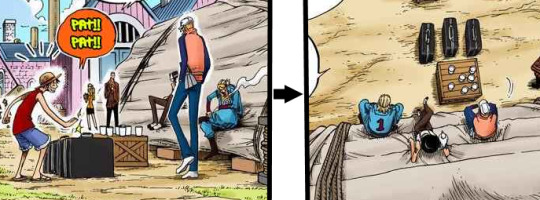
The first real indication we get regarding their comfort level with each other comes in chapter 327 when Kaku gets back from examining the Merry and goes to sit down to explain what he’s discovered. Paulie’s the closest to him, but he actually ends up stepping past both him and Lucci in order to sit directly beside Lucci on the same level.
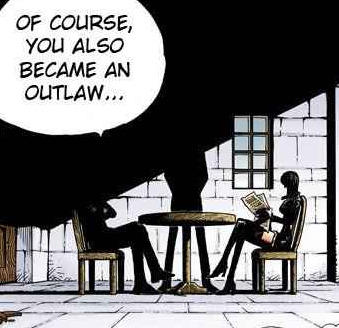
It’s quite a while before we see the two of them alone again, and it doesn’t happen until chapter 339 when they’re speaking with Robin. Of course at the time we’re not supposed to know it’s them, but there’s really nobody else it can be since this is happening at the exact same time that Blueno’s talking with Franky and Kokoro at the bar. So, as will become fairly common, the two of them are again acting as a unit of their own within the larger group.

And then, of course, we get the infiltration of the mansion prior to The Big Reveal (which I’ve spoken about before because for me it’s still the single greatest reveal in the entire manga because of how carefully crafted it is, right down to Kaku’s limited dialogue in this section being completely devoid of his usual speech quirks in the original Japanese text). Once again, Blueno and Kalifa are doing their own things while these two are working together.
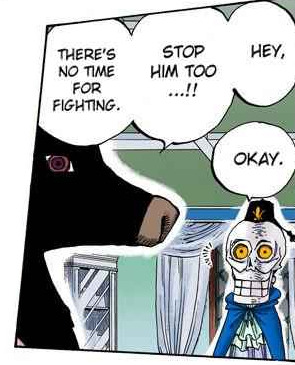
This panel has always been interesting to me because immediately prior to this Lucci says he can’t let Paulie live, and then he decides to just restrain him instead. In Luffy’s case it makes sense because they gave their word to Robin not to harm the Strawhats, but he has absolutely no reason to spare Paulie, and the little lines of shock/surprise beside Kaku imply that he hadn’t expected Lucci to do that, either. The ‘why’ is still unclear, but it’s interesting nonetheless, and it’s also…noteworthy that it’s the only thing Lucci asks Kaku to do. All of the actual damage Paulie takes comes from Lucci and he never asks for or expects Kaku to harm him.
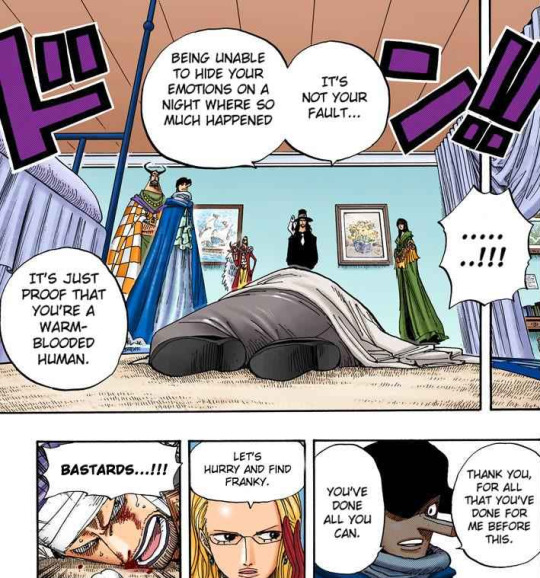
I never connected these two panels before but it’s obviously very deliberate to have Lucci telling Iceburg that feeling emotions is a sign of humanity followed immediately by Kaku��demonstrating exactly that and thanking Iceburg. It’s important to establish that part of Kaku’s character, but keep in mind Lucci’s lack of a reaction here because it’ll come back later.
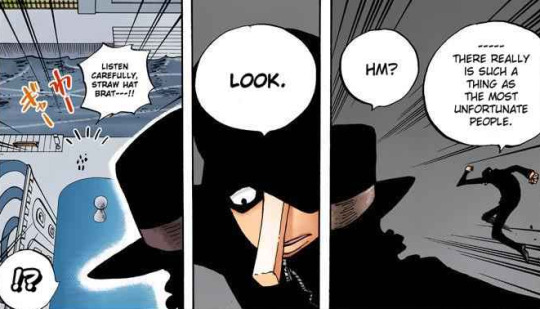
Again, very tiny moment, but there’s a lot of examples of Lucci deferring to Kaku or letting him take the lead without any hesitation, and I like this because Kaku’s noticed something that Lucci hasn’t and Lucci just goes with it immediately.
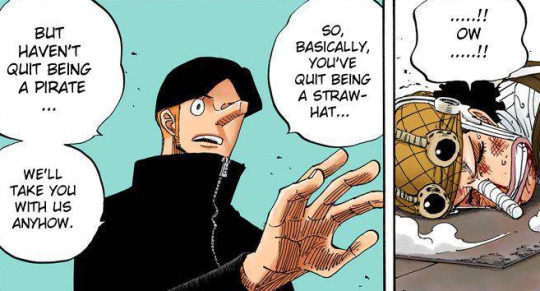
I’d forgotten about this but Kaku’s also the one that decides to take Usopp with them, first by recognizing him as one of the Strawhats and then going through with it even after finding out he doesn’t consider himself a part of them anymore. And Lucci just…stands back and lets him give out orders to the others while doing so.
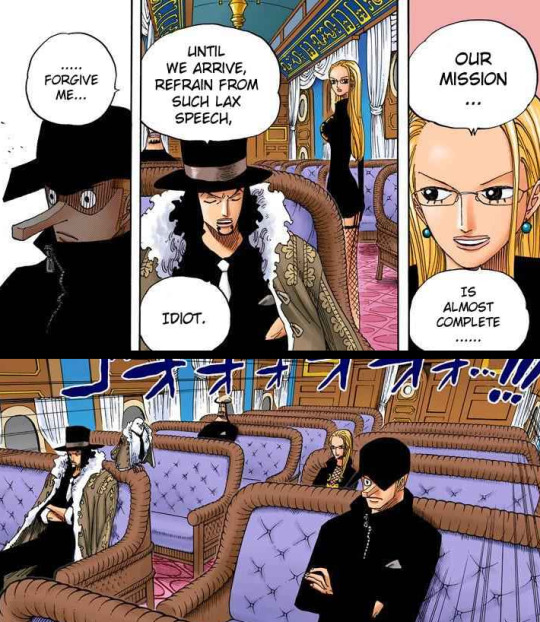
Okay so this is what I was referencing earlier. Kaku shows actual emotions with Iceburg and Lucci’s silent, but the moment Kalifa gets even slightly happy about completing the mission he’s berating her instantly. Kaku’s expression here is interesting too because he looks absolutely haunted and it’s very telling.
And also another visual representation of Lucci and Kaku being equal to/on the same level as each other.
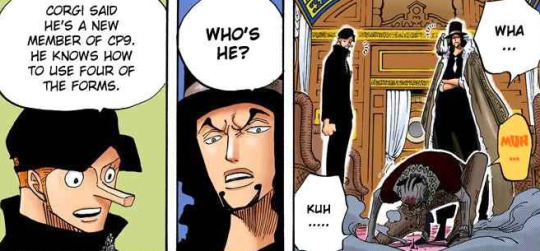
I didn’t include the panel but Kaku was ‘sleeping’ when Corgi was giving them all of the information about Nero while Lucci was (seemingly) wide awake, and yet Lucci has no idea who he is and relies on Kaku to have all the information. Which he does.

Kaku being the one to take charge again and direct the others even though Lucci’s standing right there. They do this more than I’d realized at first, especially since Lucci always seems to be looked at as the unofficial ‘leader’ of CP9.
Enies Lobby
We’ve made it to Enies Lobby, which is the first glimpse we get of these two interacting with the full CP9 group outside of any sort of ‘mission’ environment.
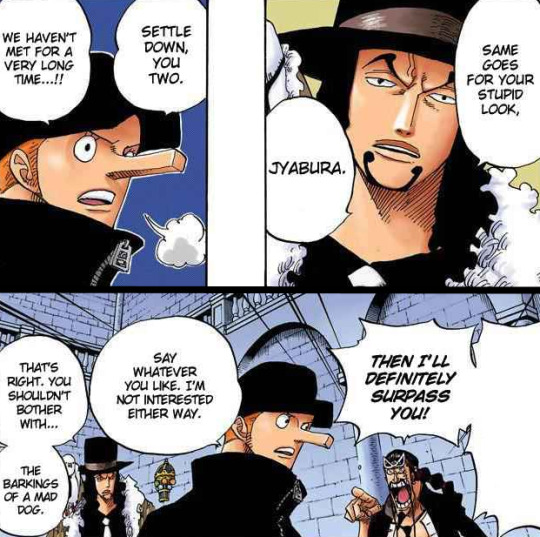
Mostly it entails Lucci being more combative (especially with Jabra) and Kaku being more annoyed, but again I can’t really imagine anyone else taking this tone with Lucci and getting away with it while Kaku does it fairly often and Lucci never retorts or gets angry with him.
And while Kaku’s not immune to taking Jabra’s bait in the right circumstances, his typical tendency is to de-escalate situations if he can and here he’s refusing to engage despite being deliberately called out…and Lucci, without being asked, immediately takes his side and defends his choice.
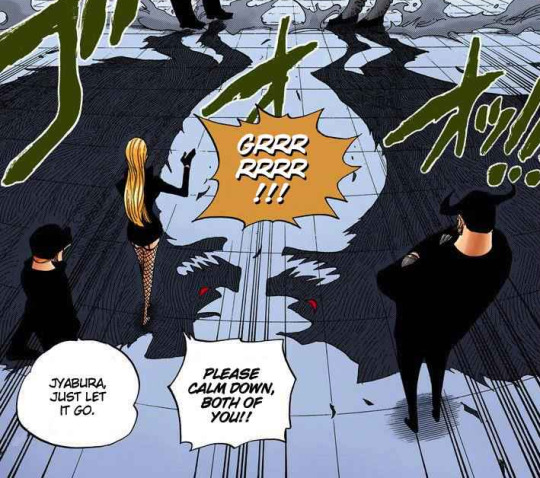
This is practically the next panel and while both Lucci and Jabra are kind of equally at fault for this little display, Kaku only berates Jabra for it while Kalifa’s directing her comments at both of them.
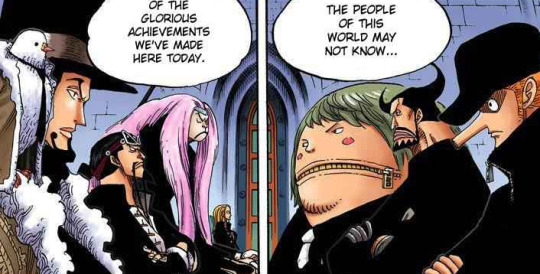
Now that I’m actually looking for these sorts of things it’s becoming more obvious, but again we have Lucci and Kaku in an equal position to each other at the front of CP9.
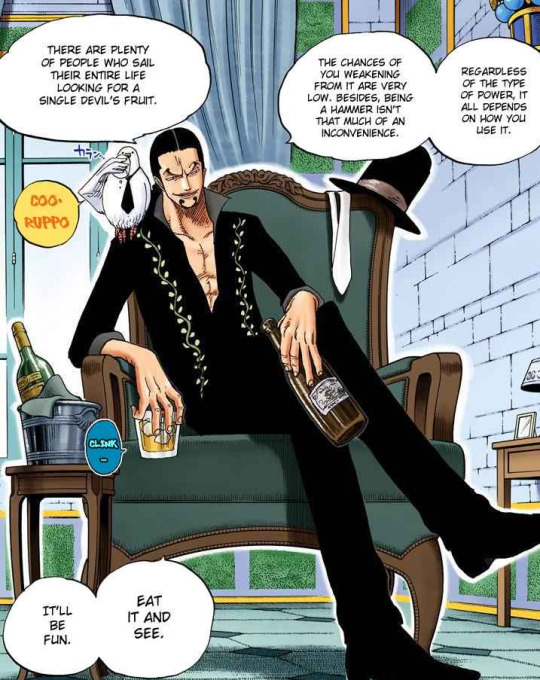
This isn’t just to Kaku since Kalifa’s there as well, but Lucci’s still encouraging them to eat the fruits and I have to believe it’s coming from a place of good faith because he’d know whether or not being able to swim is that big an issue in their profession. I also want to note that Kaku echoes Lucci’s ‘it’ll be fun’ line when he actually does eat his fruit, so obviously that resonated with him.
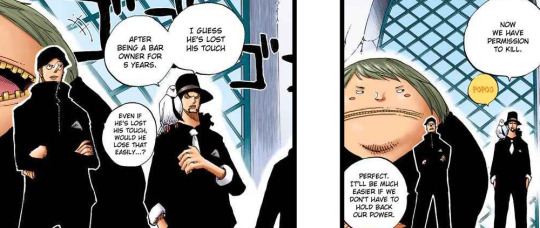
I’ve put these two together because they both highlight the same thing, that being in both of these sequences we get almost all of CP9 giving out their individual thoughts/comments on what’s happening but Kaku’s statement both times is a direct reply to what Lucci says, so again the two of them are paired off in a way that doesn’t include anyone else there.
The only other thing of note in this section is that while Robin’s talking about what happened during the Buster Call on Ohara, Kaku and Lucci are the only CP9 members to kind of…break formation and actually look at her while she’s speaking, which is interesting.
And for the rest of Enies Lobby they aren’t together so there’s not too much more to say here other than Kaku of course being the one to have the actual key to Robin’s cuffs, but it’s never made explicit who came up with that plan or handed out the keys so…if I ever actually do the thing and write a full analysis of Kaku’s character we can talk about it then Lark you’ve been saying you’ll do this for years IF I EVER--
Interlude - CP9’s Independent Report
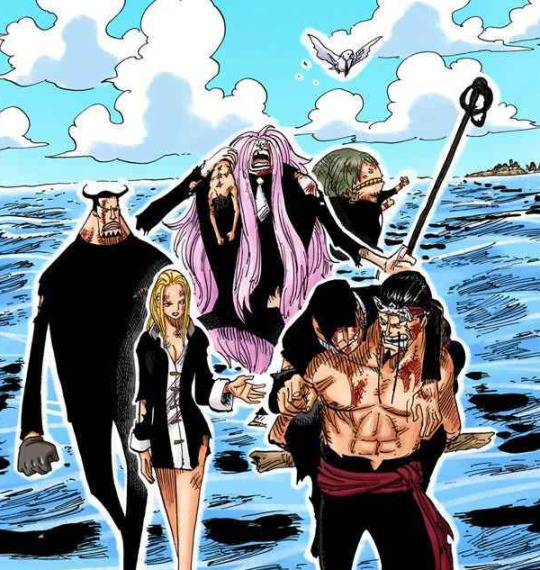
Besides the fact that this is still one of my favorite cover stories, there’s a couple of noteworthy things here, the first of which is that Kaku again is taking the lead. Even though he’s the only other CP9 member other than Lucci to be injured badly enough that he can’t walk on his own, he’s still the one directing them where to go.
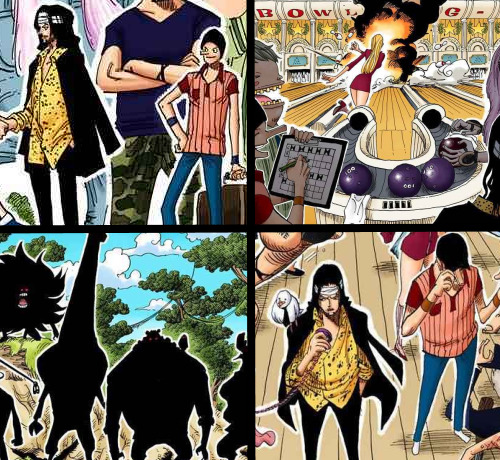
Other than that, I love seeing all of them just…interacting like friends and being very relaxed and casual, and pretty much every panel where Kaku and Lucci are together they’re directly beside each other so I’ve included a bunch of those here.
Dressrosa & Egghead
The next time we see Lucci and Kaku is at the end of Dressrosa, where they’ve been promoted to CP0 Oda can we please get some explanation of how this happened and let me tell you, I remember this vividly because the spoilers at the time just said that Lucci was talking to ‘someone��� and when the raws came out you can bet I went right to the dialogue to see if it was Kaku because his way of speaking is so telling.
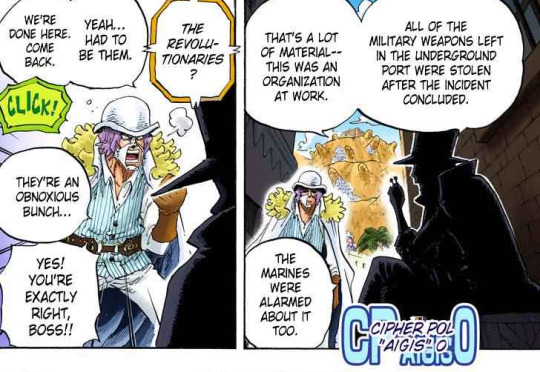
But even in this little scene, we can see they’re having an equal conversation and there’s a major difference between how Lucci’s speaking with Kaku and how he addresses Spandam mere seconds later.
After this we have the Reverie/Levely/what-even-is-this-thing-called arc where they get all of a single panel together and while it’s the first time we actually ‘see’ Kaku after the time-skip, nothing really interesting regarding their relationship happens, so let’s move on to…
The end of the colored manga! And Egghead.

We start with a very familiar situation: Lucci asking Kaku what’s going on, and while Kaku this entire arc seems more outwardly annoyed with Lucci than he ever was in the past (which is never really explained but then again, Lucci spends a lot of the arc doing things he’s specifically been told not to do, so maybe it’s understandable…), he still has all the information and relays it.
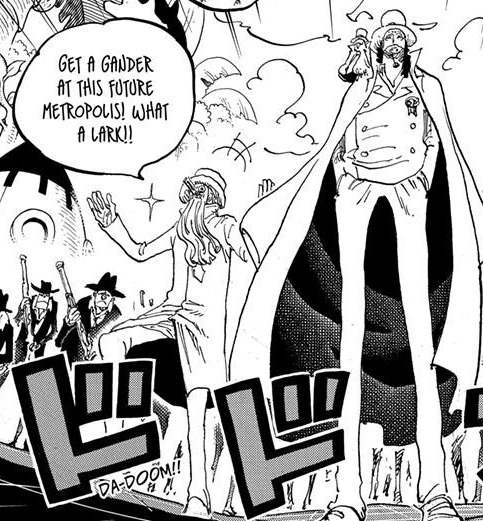
Though Kaku’s also much more comfortable letting his real personality show despite them being on a mission while before he was always completely serious after the Water 7 reveal, especially around Lucci. It came through with Zoro and Jabra but during the cover story he’s smiling and laughing a lot with Lucci right there so it makes sense he’d be more willing to let his guard down even ‘on the job’ by now.
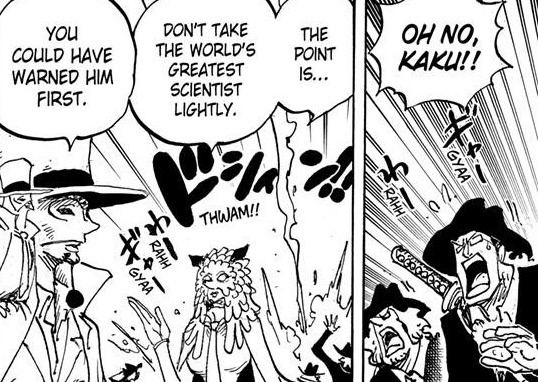
So here’s the first real instance of Lucci showing concern for Kaku, something which escalates pretty quickly throughout the arc. It’s subtle, and though he’s framing it as a suggestion to Stussy, if he didn’t care at all he wouldn’t have said anything.
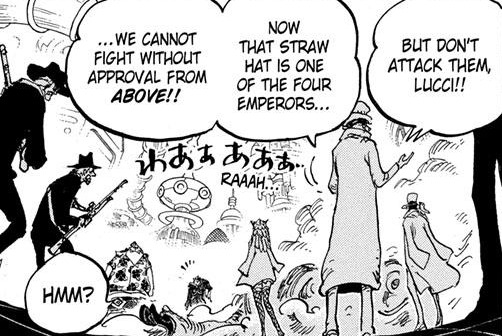
At this point it’s fairly obvious that Lucci and Kaku don’t really have any authority difference between them and Kaku spends a lot of time in this chapter especially telling Lucci to Not Do The Thing. Anyone that’s ever lived with a cat knows how well this works.
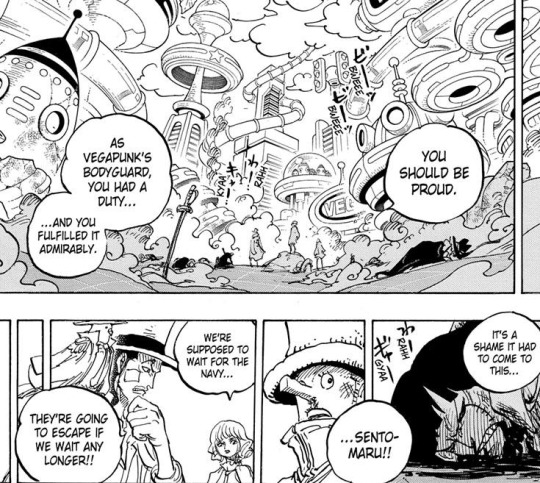
I’ve always found this bit of dialogue particularly interesting because Kaku’s very openly…praising Sentomaru for choosing his loyalty to Vegapunk over assisting the government, and there’s no way Lucci doesn’t hear him say this but he doesn’t say anything in return. There’s no real evidence that Lucci knows about Kaku willingly giving up the key to Zoro or how conflicted he was about Paulie and everyone else, but this seems to imply that at the very least, even if he doesn’t share those sentiments, he wouldn’t think less of Kaku because of it.
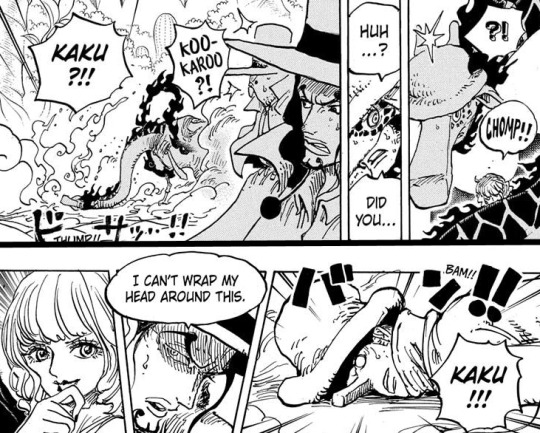
Putting these two together since they’re in the same scene but at this point it’s not even subtle concern anymore, Lucci’s genuinely worried for Kaku and you can tell this caught him off-guard.
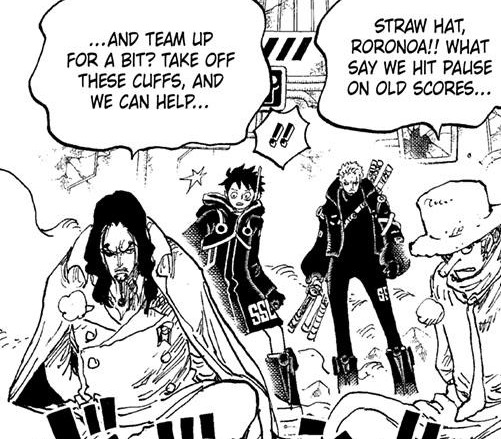
Kaku’s the first one to suggest working together but Lucci immediately backs him up and goes with the idea. It’s logical in the sense that it’ll give them the biggest chance to survive, but willingly working with pirates isn’t exactly the sort of thing that Lucci, especially in the past, would have so easily done regardless of the situation.
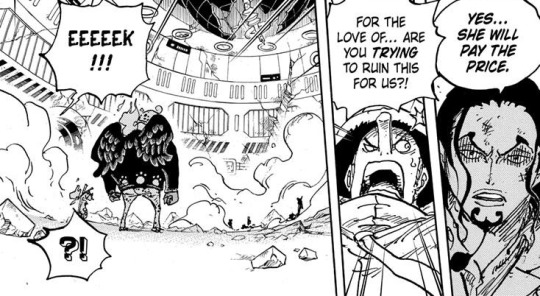
So at this point it’s becoming clear that this whole 4-v-2 section is supposed to be the most…light-hearted thing going on right now and a lot of it is played to be comedic, including Lucci’s inability to lie, but yet again there’s almost nobody else that could get away with scolding him the way Kaku’s doing here.
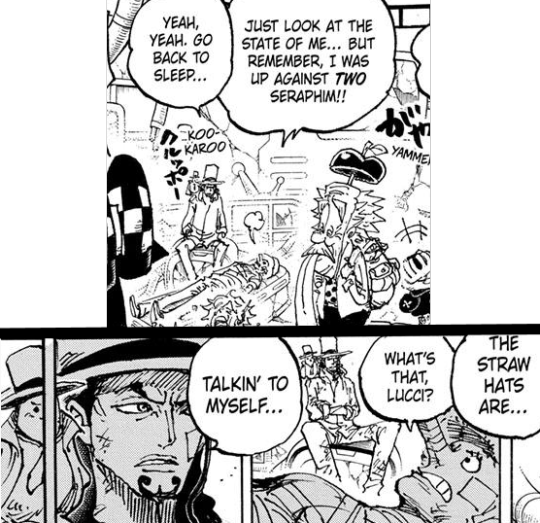
…And then we skip ahead a day and things happen that I really hope get explained at some point because they seem important, but while Lucci’s never going to have impeccable bedside manner, he’s very concerned with getting Kaku to rest and while Kaku’s trying to justify what happened Lucci really doesn’t seem to care about that. It’s a big departure from him being willing to write off anyone he deems ‘too weak’ and it’s a nice character moment.
I’d mentioned on my liveblog that some of the things Lucci was doing after this point were confusing, but if you look at them through the lens of him wanting to protect Kaku, it makes a lot more sense. Yes, he’s deliberately keeping him out of the loop, but Lucci I think has decided that he’s going to throw caution to the wind and act alone since if Kaku can’t prove he knew about the plan, he’s probably safer being left with the Strawhats, and if the Marines show up he should be safe anyway or so Lucci thinks…

When this chapter came out, I’d said something about Lucci being a hypocrite considering what the rest of CP9 did for him when they could have easily just left him at Enies Lobby, but given what happens almost directly after and likely what he’s trying to do with this entire fight, these words feel even less genuine…
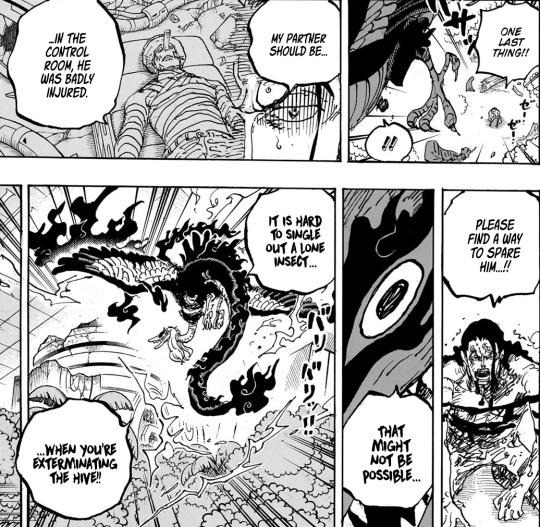
And that brings us to this. The moment that I’ve been thinking about for almost an entire week now. The moment that, looking back at…oh, wow…almost 3000 words of analysis maybe shouldn’t be as surprising as it was for most of us, but it does feel like the payoff for a long, long buildup that’s taken nearly twenty years to reach. Because really, there’s no other way to describe them other than ‘partners’, and probably hasn’t been for a long time…and I’m so glad that Lucci acknowledged it.
To summarize, I think what surprised me most about re-visiting all of this is how much the manga has framed them as equals since the beginning even though it was never explicitly stated between the characters themselves. Lucci’s always been far more lenient with Kaku than with anyone else, and Kaku in turn has never had any fear of Lucci even if he wasn’t really expressing his true self with him for a long time.
The cover story being the turning point makes perfect sense, and the progression throughout Egghead of Lucci being more outwardly willing to show his concern and Kaku not hiding his emotions at all seems like a natural progression of their relationship and their level of comfort around each other.
And the fact that Oda is never really…hitting us over the head with any of it until that final moment when Lucci says everything so plainly because Kaku’s life is the most important thing to him even when faced with a literal monster… It’s so effective.
I don’t know where we go from here. To be honest, I’m kind of scared of where we go from here. But regardless of the outcome, I hope this little essay has been at the very least interesting and perhaps allowed you to look at these two in a different light.
Thanks for reading.
#one piece#opspoilers#rob lucci#kaku#meta#analysis#i forgot about the 30 photo limit so I had to get creative here but#3k words of me examining their relationship sure happened
196 notes
·
View notes
Note
Hi, i just learned about the scientific revolution in europe at school. Can you tell me why you dont think scientific revolutions exist? im curious!
So I feel like I have to lead with the fact that I'm kind of arguing two different points when I say scientific revolutions aren't really a thing
One is that I'm objecting to a specific, extremely foundational theory of scientific revolutions that was put forth by the philosopher Thomas Kuhn, which I think really misrepresents how science is actually practiced in the name of fitting things to a nice model. The other is that I think the fundamental problem with the idea is that it's too vague to effectively describe an actual process that happens.
It's certainly true that there are important advances in science that get referred to as "revolutions" that fundamentally changed their fields -- the shift from the Ptolemaic model of the Solar System to the Copernican one, Darwin's theory of evolution, etc. But there are historians of science (who I tend to agree with) that feel that terming these advances "revolutions" ignores the fact that science is an continuous, accretional process, and somewhat sensationalizes the process of scientific change in the name of celebrating particular scientists or theories over others.
Kuhn's model that he put forth in The Structure of Scientific Revolutions (which is one of those books that itself stirred a great deal of activity in a number of fields) suggests science evolves via what he called "paradigm shifts," where new ideas become fundamentally incompatible with the old model or way of doing things, causing a total overturn in the way scientists see the world, and establishing a new paradigm -- which will eventually cave to another when it, too, ceases to function effectively as a model. This theory became extraordinarily popular when it was published, but it's somewhat telling who it's remained popular with. Economists, political scientists, and literary theorists still use Kuhn, but historians of science, in my experience at least, see his work as historically significant but incompatible with how history is actually studied.
Kuhn posits that between paradigm shifts there are periods of "normal science" where paradigms are unquestioned and anomalies in the current model are largely ignored, until they reach a critical mass and cause a scientific revolution. In reality though, there is often real discussion of those anomalies, and I think the scientific process is not nearly so content to ignore them as Kuhn thinks. Throughout history, we see people expressing a real discontent with unsolved mysteries the current scientific model fails to explain, and glossing over those simply because the individuals in question didn't manage to formulate breakthrough theories to "solve" those problems props up the somewhat infamous "great men" model of history of science, where we focus only on the most famous people in the field as significant instead of acknowledging that science is a social enterprise and no research happens in a vacuum!
Beyond disagreeing with Kuhn specifically though, I think the idea of scientific revolutions vastly simplifies how science evolves and changes, and is ultimately a really ahistorical way of thinking about shifts in thinking. Take the example of the shift from Ptolemaic, geocentric thought to the heliocentric Copernican model of the solar system. When does this supposed "revolution" in thought actually start, and when does it "end" by becoming firmly established? You could argue that the publication of Copernicus' De revolutionibus orbium coelestium in 1543 was the beginning of the shift in thinking -- but of course, then you have the problem of asking where Copernicus' ideas came from in the first place.
The "great men" model of history would suggest Copernicus was a uniquely talented individual who managed to suggest something no one else had ever put forth, but realistically, he was influenced by the scientists who came before him, just like anyone else. There were real objections to the Ptolemaic model during the medieval era! One of the most famous problems in medieval astronomy was the fact that assuming a geocentric model makes the behavior of the planets seem really weird to an observer on Earth, referred to as retrograde motion, which had to be solved with a complicated system of epicycles that people knew wasn't quite working, even if they weren't able to put together exactly why. There were even ancient Greek astronomers who suggested that the sun was at the center of the solar system, going all the way back to Aristarchus of Samos who lived from around 310-230 BCE!
Putting an end point to the Copernican revolution poses similar challenges. Some people opt to suggest that what Copernicus started, either Galileo or Newton finished (which in and of itself means the "revolution" lasted around 100-150 years), but are we defining the shift in terms of new theories, or the consensus of the scientific community? The latter is much harder to pinpoint, and in my opinion as an aspiring historian of science, also much more important. Again, science doesn't happen in a vacuum. Copernicus, Galileo, and Newton may be more famous than their peers, but that doesn't mean the rest of the Renaissance scientific community didn't matter.
Ultimately it's a matter of simple models like Kuhn's (or other definitions of scientific revolutions) being insufficient to explain the complexity of history. Both because science is a complex endeavor, and because it isn't independent from the rest of history. Sure, it's genuinely amazing to consider that Copernicus' De revolutionibus orbium coelestium and the anatomist Andreas Vesalius' similarly influential De humani corporis fabrica were published the same year, and it says something about the intellectual climate of the time. But does it say something about science only, or is it also worth remembering that the introduction of typographic printing a century prior drastically changed how scientists communicated and whose ideas stuck and were remembered? On a similar note, we credit Darwin with suggesting the theory of evolution (and I could write a similarly long response just on the many, many influences in geology and biology both that went into his formulation of said theory), but what does it say that Alfred Russel Wallace independently came up with the theory of natural selection around the same time? Is it sheer coincidence, or does it have more to do with conversations that were already happening in the scientific community both men belonged to that predated the publication of the Origin?
I think that the concept of scientific revolutions is an important part of the history of the history of science, and has its place when talking about how we conceive of certain periods of history. But I'm a skeptic of it being a particularly accurate model, largely on the grounds of objecting to the "great men" model of history and the idea that shifts in thinking can be boiled down to a few important names and dates.
There's a famous Isaac Newton quote (which, fittingly, did not originate with Newton himself, but can be traced back even further to several medieval thinkers) in which he states "If I have seen further it is by standing on the shoulders of Giants." I would argue that science, as an endeavor, is far more like standing on the shoulder of several hundred thousand other people in a trenchcoat. This social element of research is exactly why it's so hard to pull apart any one particular revolution, even when fairly revolutionary theories change the direction of the research that's happening. Ideas belong to a long evolutionary chain, and even if it occasionally goes through periods of punctuated equilibrium, dividing that history into periods of revolution and stagnancy ignores the rich scientific tradition of the "in-between" periods, and the contributions of scientists who never became famous for their work.
#SORRY FOR WRITING A NOVEL#i hope this makes sense and that i am not too deep in the history of science theory to give a good explanation#a much shorter tl;dr answer would be that my stance towards scientific revolutions is more skepticism than total rejection#but hyperbole gets the job done a lot faster haha#getting to the point that i really should have a#history of science tag
368 notes
·
View notes
Text
I'm not the first person to bring this up but, I do feel that the general response to the gun range scene has mostly failed to acknowledge the context that would call for such extreme levels of self-defense training in the first place. We know from episode 23 that even just a few years after the release of the doodler (when Lark and Sparrow themselves are still just teens) things are already pretty bad (to the extent that in Lark's case the stress of it all has already begun to take a physical toll on him- don't forget that he and Sparrow too were once kids who had the world placed on their shoulders), and one need only look at how quickly the situation with the mayor has degraded to imagine how bad things would have gotten by the time Hero was 12. Training your six-year-old to use a gun in a normal or at least mostly normal world? Batshit crazy. Training your six-year-old to use a gun in a world overrun by an eldritch horror where danger, death, and the possibility of corruption from said eldritch horror are around every corner? Still intense but, much easier to understand the reasoning behind.
oh oops it's a long post woops woops woops
In Sparrow's case in particular, we know that he behaves quite differently under alternative circumstances, and that Normal (Hero too for that matter) lives a pretty different life in a post code purple world:


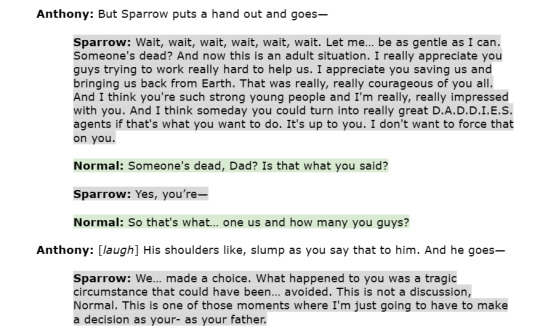
Not that it hasn't been Sparrow's intent and priority to mitigate the extent to which Normal was caught up in everything from the get-go, as evidenced by his namesake. Recall what he had to say on the matter:
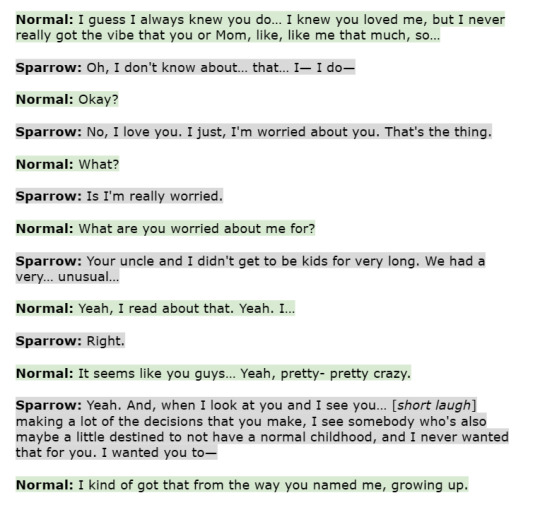
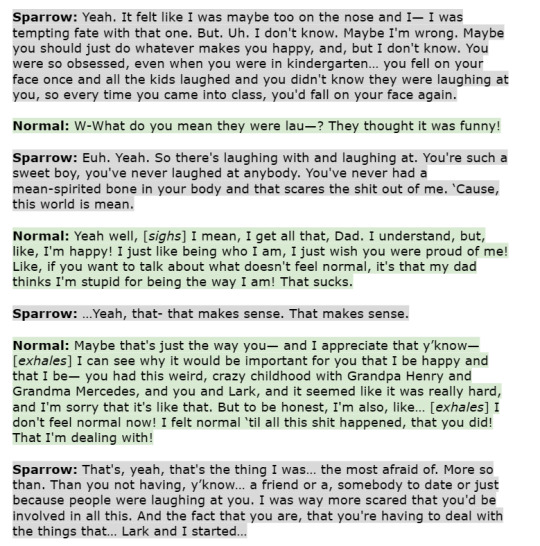
In some ways this extreme self-defense training is a "two sides of the same coin" sort of deal vis-a-vis Grant's extreme isolation of Lincoln for his protection, a major difference being that Lincoln still deals with this in a post code purple world (to the extent that he literally had to pretend to starve himself to get his dad to let him go to public school), whereas Normal and Hero get the chance to live mostly normal lives and do as they please (the disapproving words of a drunken and partially-doodlerized Sparrow aside), now removed from the immediate threat of the doodler.
Hero's case is, at least from what we currently know about the prophecy, more complicated than Norm's. It is easy to reprimand Lark and Sparrow as being the worst parents (and/or uncles) whilst forgetting that their circumstances are fundamentally different from the other kiddads. The first half of this lying in their shared responsibility (and guilt) in releasing the doodler. Grant and Nicky can retreat to their respective homes on the basis that this is the best they can do, resolving to put their energy into protecting their closest ones first and foremost. At the end of the day, they aren't really any more responsible for dealing with the doodler than any other bystander. The same cannot be said of Lark and Sparrow, who can't exactly look away from the fact that they were the ones who brought the doodler into the world. At least from their perspectives- of course Lark (and Sparrow by extension) in reality was a child that was manipulated into doing what he did, which as some people have pointed out is not dissimilar to what happened to Normal at the end of this episode (and if Sparrow felt the need to rid Normal of his memories of this event in particular, perhaps it was to spare his child from feeling guilty about it for the rest of his life).
The second half of what differentiates them is, of course, the prophecy (right- now we can actually get to Hero lol). We must remember that, as far as the twins knew, the only way to actually "defeat" the doodler permanently was through the chosen one, i.e. Hero (probably- after last episode I'm starting to think that Norm may be more directly involved in the prophecy than previously thought, but that's a tangent). "Continue to let the being you released into the world kill and torture millions (very likely billions) of people, which could wind up including both of your children, or put your ill-fated child through very intense and ultimately traumatizing training to put an end to it, potentially losing her in the process", is essentially the choice the twins were given. Hero isn't made to kill a deer with her bare hands for the hell of it, she goes through what she does because Lark (who likely did not see the same thing that Normal did on the throne- or at the very least interpreted things very differently) and Sparrow had no reason to believe that there was any other possibility. This certainly does not negate or undermine the extent to which Hero was deeply traumatized by it all, but it's not exactly a detail that you can choose to ignore when discussing the ethics of Lark and Sparrow's decision-making.
And yet, despite it all, Sparrow and Lark do ultimately chose saving their children over saving the world. Not before significant damage has already been done (to Hero that is), but they do decide to go through with the one plan that allows both of their children to (hopefully) live a doodler-free life: code purple. Code purple, which ultimately reduces to a trolley problem with a presumably near-equal number of people on both tracks, with the important difference of sparing their own children in one case, and likely not the other. And if we want to talk about Henry's ethical stance in the matter and how it compares to the twins, we need to consider what it says about him if he was *not* in favor of code purple, with all of this in mind. Not to come to any hasty conclusions about Henry either- I think there remains too many unknowns on that front to assume much and... Ultimately it's a complicated matter! But that's kind of my point.
Even post code purple, Lark and Sparrow (and the rest of the kiddads) try to pursue that which they believe (or at least hope) will both put an end to the doodler without involving their children and without the enactment of the prophecy. Is blowing up an entire world with the sun to save all the others a plan I'm gonna sit here and defend? I don't think so lol, but you can't exactly look at it and pretend that Lark and Sparrow don't care about protecting their fucking kids.
My point isn't that Lark and Sparrow haven't made a lot of mistakes and questionable decisions, my point is that their circumstances are so much less black and white than the majority of the takes I see on them make them out to be, and a lot of the conclusions I see people jump to when it comes to the twins' feelings and intentions strike me as... Pretty odd? Tangentially-related: if you don't think Sparrow is someone who is affectionate with and deeply loves his kids despite his flaws, I don't really think we're listening to the same podcast. But even in Lark's case, yes he's more subtle about it and yes, Lark can be quick to anger (not that I personally read him yelling in the last episode as anger so much as panic but all the same), but affection can be sewing bulletproof material into your nephew's mascot costume, or secretly taking him out for pizza, or pretending to be his dad so that you can tell him you're proud of him, or putting your gun down when he asks you to. The twins are anything but perfect but, fuck if they aren't trying (and changing, and improving). And yes, they deserve some damn nuance.
Also, okay, I couldn't really find a neat way to bring this up in the above but, speaking of no-nuance and bad faith takes, can we talk about the locks? Or lack thereof, rather. "How could they be so stupid as to leave the door unlocked?" you're right, that does seem odd, and Anthony made a point to explain that every other door was very thoroughly locked, and Normal seemed to have practically been moved into opening the door against his own will so... Hear me out, maybe, just maybe, the door usually *is* locked??? And something fishy or unusual is afoot? I also wouldn't take their immediate, knee-jerk reactions to a dangerous flesh monster being released to come to any conclusions on whether or not Lark and Sparrow "blame" six-year-old Normal for it. In Sparrow's case, I struggle to even imagine it. In Lark's case, though I wouldn't put him above getting angry over it, my doubts on his deeper feelings are still high. Conversely, if he actually did place some of the blame on Normal, at the very least there is an interesting discussion to be had on how this relates to Lark's own guilt over what Willy manipulated him into doing, and subsequently being denied the catharsis of punishment. But I'm getting ahead of myself. Like I said, a lot of important things are yet unknown.
*breathes* okay end of overdue ramble [insert proper conclusion paragraph here lol], thank you.
#dndads#dungeons and daddies#boy. yeah always an ordeal discussing matters related to Hero. Easy to attract misunderstanding- I think. Again it is. A Complicated Affair#but well- had to share my two cents otherwise it surely woulda bugged me lots#hopefully this all makes sense enough I know I kinda went a bunch of different places as usual :0#sparrow oak#lark oak#hero oak swallows garcia#normal oak swallows garcia#normal oak#lark oak garcia#sparrow oak garcia#dndads s2 ep 47#baba babbles
215 notes
·
View notes
Text
Don’t y’all love it when a popular tiktok creator is analyzing a character and interpreting it so, so wrong, and him and his dumb ass take is spreading.
Like it was one thing for you to be wrong
ITS ANOTHER THING FOR YOU TO BE WRONG AND MAKING OTHER PEOPLE MORE WRONG
If one more person says that Izuku is “underdeveloped” and that he’s “uninterested in all of his other relationships” and that he “has a power imbalance in his relationships with other characters bc they care more about him than he does them” STOP. PLEASE STOP.
A fundamental part of Izuku’s character: He is an UNRELIABLE NARRATOR. Most of his character is, therefore, told through SUBTEXT.
Izuku doesn’t say that he feels ashamed about his feelings for Katsuki.
But he does say that he thinks they’re gross.
Izuku doesn’t say that he thinks that Toga and her feelings aren’t human
But he does say that she is the “perfect counter to this quirk”.
THE LIST COULD GO ON.
Izuku is an unreliable narrator in a third person omniscient story (though sometimes mha acts more like a third person objective story? Anyway). That means that the way we do not understand the story is not through a retelling of what is happening to you, the viewer, unreliably—instead it is not telling you the full extent of his character and his thoughts.
To say “izuocha’s relationship is underdeveloped because it’s one sided” is NOT the same as saying “bkdk’s relationship is underdeveloped because it’s one sided”.
Izuku has always been obsessed with Katsuki. At some point the rhetoric being passed around was that it was Katsuki who was underdeveloped and uninterested in the dynamic. Now that rhetoric has been reversed since we’ve seen so much of Katsuki’s POV.
Ochako has always been obsessed with Izuku, NEVER THE OTHER WAY AROUND. In fact, Ochako’s arc even surrounded letting go of those feelings… as literally said in the text. Because that is a textual statement that she makes.
Izuku does not understand how or what Ochako loves in anybody, especially him. She loves a unique sense of personhood, which Izuku has always carried, and of which she saw in the entrance exam.
Izuku does not know how to view things he deems as “girly”, and Ochako very personally CANT be in a relationship with someone that she has realized is very repressed. Her friendships turn from friends to fascination very quickly, into her heroic form. (Think her few moments with Katsuki in that extra, or how disinterested she became of Izuku as she saw him run away from help, and not know how to respond to an apology. Or, hell, how much more interested she became when Himiko was honest with her feelings in their second real confrontation. She even says that she “admires how she can love so freely, and say it with her whole chest”)
LIKE ALL OF THESE THINGS. THIS IS WHY IZUOCHA ISNT DEVELOPED. That’s a purposeful choice in genius writing, at least in my opinion.
Bkdk is a result of Izuku being uninterested in acknowledging said feelings, and this is shown to be different because of the amount of times he has had that imply a deeper emotion or thought that we are not told. Think black whip, controlling your heart solely surrounding katsuki, “my feelings are gross”, the ear piercing scream when katsuki was kidnapped and the “this was a total loss” line, relaxing into katsuki’s arms after the apology, only coming home because of Katsuki, comparing romantic feelings toga had for him and admiration to ALLMIGHT and not katsuki who was “actually in his life”, I COULD GO ON FOR HOURS.
This is absolutely NOT underdeveloped, this is called SHOW NOT TELL. Horikoshi is so purposeful in what he shows vs what he tells. He tells you that ochako and toga are the same, he tells you that katsuki is worried about Izuku, he tells you that katsuki is there to step in when deku can’t handle it on his own, he tells you that ochako has a crush on Izuku, and he tells you that Katsuki is Izuku’s “closest person”.
But he also SHOWS YOU SO MUCH MORE. Unreliable narration is such a key part of Izuku and his character. Izuku doesn’t understand Izuku as much as the audience doesn’t understand him. It’s why I genuinely think most interpretations of his character are wrong, because you really can’t take him at his word. It’s the same reason no one understood katsuki for the longest time, he was in the same circumstances of a character who is only showed to you, not told.
I know i named so many god damn references so if anyone is curious as to what specifically I’m talking about with what, I’ll gladly show what scene I’m referring to. Apparently I can’t remember a damn thing but this manga anyway.
#I’ll gladly be shouting this to the rooftops no one can shut me up#this was made like a month ago idk if anyone could tell but I just edited it LMAO#bkdk#midoriya izuku#mha deku#bkdk brainrot#bakudeku#bnha deku#mha analysis
312 notes
·
View notes
Text
Actually, I think what I want to talk about regarding Feet of Clay is something that's often overlooked, which is also my favourite thing to talk about regarding serious Discworld topics: Vetinari, and perception, and ableism.
In Feet of Clay, we're already seeing the turn from "let's get rid of the Patrician entirely, possibly by murder or at least Guild-approved inhumation" to "let's make him seem unfit to govern so that he has to step down, giving us a proper transition because we know everything will turn to shit if he's instantly gone." And that's progress of a sort, right? People are acknowledging his skill as a politician, and the fact that removing him from power with no plan for what comes next will cause the whole city to collapse.
But why do people want to say he's unfit to rule, specifically?
We know that at least some of the answer is that 'concerned citizens' think he's too soft on immigration, and he's not a king so why does he get to tell people what to do, and shouldn't he just rein Vimes in a bit instead of letting him go poking around in people's business. But I'm not sure that's the whole story.
What I would like to know is: why does this change to "make him look incapable" happen now? Is it coincidence that people make that switch once he starts walking with a cane? I don't know if it is.
On the one hand, they might have just given up. Even the gonne couldn't kill him, he's got a few people around him he can trust, maybe assassination isn't even worth trying any more. Things are stable, anyway, no point fucking everything up when you can have a nice, peaceful, planned transition of power to whoever is going to do what you want to do.
But on the other hand... Vetinari is disabled now. He uses a mobility aid. It's visible to everyone that he isn't the same as he used to be. I imagine the kind of people who don't want dwarves and trolls in the city, or who think that it's fine if poor people are treated like shit, are also not particularly liberal when it comes to disability too. Would it really be so hard to say "oh, well, he's not getting any younger... and of course with his bad leg..." and imply that any sudden decline in his physical or mental state is to be expected? That it's all just getting too much for him? An injury like that, well,he must be on some strong medication for the pain, surely? And so on. Putting the idea in people's heads that a disabled person in this job is at an automatic disadvantage- it doesn't matter if they actually believe it, personally, because the point is that somebody will.
And the thing is... it looks like kindness. It looks like acknowledgement of pain and understanding of new limitations. But having been on the receiving end of that shit, I can tell you it's not. It's an assumption that you are fundamentally Less Than, and that rather than using the people and things around you to maximise what you can do, you should just go away entirely.
Does any of this work? Nope. Is Vetinari aware of it and taking advantage of ableist assumptions? Yep. But those assumptions, I feel, still have to have existed in the first place if they're going to be disproved.
318 notes
·
View notes
Text
coffee theory and the disparaging of aziraphale’s character
ok y’all buckle up, we’re finally talking about why coffee theory not only disparages aziraphale’s character but would cheapen the story.
this is a meta i’ve been trying to write for ages now because i know i have Thoughts but trying to communicate them in a coherent and not passive aggressive way is… difficult to say the least.
i have a few main points i’m gonna touch on in this post:
1) why coffee theory disparages aziraphale’s character and removes him of his agency
2) why it would cheapen the story
3) how it underestimates neil’s talent as a writer
4) why the implications of it irk me
ok. let’s get into this.
firstly, a run down of coffee theory for anyone who’s managed to miss it. coffee theory basically states that the metatron drugged/manipulated the coffee he gave aziraphale such that the coffee was what led to aziraphale making the decision to go to heaven. (i.e. he wasn’t himself, he was under the influence and that’s why he did what he did)
why coffee theory disparages aziraphale’s character and removes him of his agency
look. i understand that aziraphale’s decision to go to heaven and take up the position of supreme archangel hurt. i understand that a lot of y’all were angry at him, and many of y’all still are angry with his decision. that is so totally valid and i’m not saying you’re wrong for being upset.
but what i do have to say is this: you can be angry at him while simultaneously acknowledging that his decision makes sense in the context of his character. those two truths can coexist without contradiction.
i think that a lot of people (myself included) have this unconscious tendency to view characters through our own warped perceptions of them rather than their actual character. like we all have our own headcanons about the characters and media we enjoy, but sometimes they get away from us and we start projecting complete headcanon onto real actual canon plot.
so let’s talk canon for a minute. the show has shown us time and time again that aziraphale fundamentally believes Heaven is good. he knows the angels are mean or bad sometimes but he thinks that capital H Heaven is good. that God’s plan is good. he believes that being an angel makes you good.
“i know the angel you were.” “you’re a demon you lied.” “you’re the bad guys.” “we’re hereditary enemies” “there is no our side”. aziraphale believes that being an angel and being on the side of Heaven is what makes you good. yes he knows crowley is good but aziraphale thinks it’s because of his past status as an angel. that it’s in spite of his demonic nature.
aziraphale believes that with the help of someone good (properly good, not pretend-y good) Heaven can be perfect and good and share that goodness with humanity. and he’s been given the opportunity to do that, alongside crowley no less!
aziraphale doesn’t fully understand how corrupt Heaven truly is. and nobody can get that across to him. not even crowley. miscommunication is an issue between them, yes. but it’s not the only issue. aziraphale fundamentally believes in Heaven, and crowley does not.
so of course aziraphale chose going to Heaven and being in charge because now he can truly enact change. his decision makes so. much. sense.
and coffee theory? coffee theory would strip aziraphale of all his depth and complexity as a character. it would say “yeah he has this long history of being hurt by this institution but his faith in it is so strong that he was willing to leave the one being he loved most in the universe behind if it meant fixing the institution and creating a safe future for him and his lover. but actually he just got drugged lol.” like. how utterly disappointing would that be? it strips him of his agency, it strips him of his complexity, it makes him boring. and boring is one of the worst things a character can be.
aziraphale is allowed to be a complex character. he’s allowed to make decisions you don’t like. in fact i think he should. that’s what happens in stories. especially in good ones. characters make decisions you don’t like all the time but what matters is if the decision makes sense. and aziraphale’s decision makes all the sense. no matter how upset it made you, it checks out.
why it would cheapen the story
look me in the eyes when i say this: most of y’all would probably hate coffee theory in practice because it is such a cop out plot twist.
coffee theory fundamentally disallows complexity to aziraphale’s decision to leave earth. it makes it a “oh no he was drugged!” situation instead of a “he has a lot of shit to work through and he’s hurting and the being he loves is hurting and the world is gonna end and he needs to work on himself before he can save the world properly.” situation.
coffee theory is bred out of the knee jerk instinct to say aziraphale was completely wrong and crowley was right and “i need to explain away aziraphale’s decision because he would never hurt crowley!!!”
y’all. i love aziraphale, do not get me wrong. but have we been watching the same show? aziraphale has hurt crowley, multiple times. he’s said many hurtful things. and it all comes back to the same reason: he believes Heaven and angels are good, and demons and Hell are bad.
it’s all connected. and i want to see the show acknowledge all of that. push it to the surface and let them confront it all. not brush away the hurt with some cheap “he was drugged!” plot twist. it’s boring and disappointing.
how it underestimates neil’s talent as a writer
neil is a good writer. i’m not gonna entertain arguments about this, if you like good omens you like neil’s writing. (and i highly suggest you read his other novels). and if there’s one thing i’ve found in my time reading neil’s books it’s that everything is intentional.
how much time does this fandom spend dissecting every single frame of the show because we know nothing is accidental? that is not a good omens specific thing, it’s in all of neil’s works (at least the ones i’ve read). neil is incredibly intentional in what he does, and in my experience he doesn’t rely on cheap plot twists.
he can plot twist the ever living daylights out of you but it will never be a cheap cop out like “he was drugged!” and acting like coffee theory is actually plausible is frankly an underestimation of what neil is capable of as a writer.
why the implications of it irk me
can we all just agree that the fandom likes crowley more? and that whenever aziraphale does anything slightly complex it’s often times either met with “oh nonono here’s this reason that doesn’t allow him any complexity” or “i hate him!!!! (also doesn’t allow complexity)”
you can adore crowley. i adore him too, i relate to him very deeply. but i love aziraphale too and i’m kind of tired of how frequent the aziraphale slander is.
and coffee theory, if i’m being honest, feels very much like y’all just can’t handle aziraphle being anything more than “silly little gay angel running the bookshop”. it feels like people just can’t handle the fact that he has his own motivations and feelings and that he truly thinks he’s doing the right thing.
and it’s to the point that you need to convince yourself he was DRUGGED so that you can accept his decisions?? y’all. did we watch the same show?
#i knew this would be long but damn. didn’t think it’d be this long.#i would apologize for the length but this took so long to write i’m not even sorry#i hope i articulated my point well enough that no one misinterprets it#and i’m totally open to discussion about this but just be respectful#i tried my best not to be rude and if i came across rude that was definitely not my intention#anyways i hope someone enjoys this nonesense#good omens#good omens meta#gomens meta#meta#coffee theory#anti coffee theory#ineffable divorce#aziraphale#aziraphale apologist#supreme archangel aziraphale#aziracrow#ineffable husbands#crowley#good omens 2
94 notes
·
View notes
Note
Jim and Oluwande got the worst end of the deal. I'd even say they regressed as both characters and partners and anything they had built up in s1 was almost completely stripped away from them. The way they're portrayed together and apart in s2 is not only unlike the characters we saw in s1, but their rich storyline was reduced to extreme side characters used only as plot devices in a way they absolutely did not have to be used. I LOVED them in s1, and I was so disappointed by what s2 did to them and their potential growth, which I think applies to pretty much everything in s2, not only them.
Mind if I piggyback of this ask to go into all my critiques of the handling of Jim/Olu in Season 2? Thanks!
OFMD Critique: Tealoranges, Dropped Storylines, and Wasted Potential
God, the issues I have with the writing of Season 2 extend in so many directions. Jim's character, I felt, was well-handled for at least the first two episodes but then slowly starts skewing wrong as early as episode 3 (I am still chewing glass over the way their reunion scene with Oluwande was written- or, rather, NOT written). Episode 4 was good, but everything after that? Someone said that Jim in the back half of the season feels more like Vico than Jim, and though I do love and appreciate Vico, it's completely true. Jim doesn't feel like the same character we've come to know, whether from Season 1 or even what is set up in early season 2.
And yet, I STILL feel like they're written better than Olu, if you can believe it? So, I haven't talked about this much, but I feel like Olu is done dirty from almost the moment he is introduced in Season 2. At least Jim (through editing alone, but hey, we'll give the show the smallest benefit of the doubt) gets an acknowledgement that they miss Olu during that flashback sequences while they talk to Archie- Olu doesn't even get that. I read about a deleted scene that would have had Pete and Olu desperate to reunite with Lucius and Jim in episode 1 and I feel like that was DESPERATELY needed to make the Season 1 finale -> Season 2 jump make any sort of sense. I like Zheng, but for the love of God, her romance with Olu (which I had my own issues with for the disservice it does both their characters) is not worth destroying the tealoranges build up from Season 1. Just cut something from the first episode or one of the Zheng/Olu scenes from the second episode to make it make sense.
Then, moving onto later in the season- I've posted about how Olu and Jim deserved the grand, epic reunion otherwise 1x10 and everything set up with them in Season 1 doesn't make sense. Could the writers of the show have possibly redistributed some of the glorious cinematography from Ed and Stede over to Jim and Olu? All I need is one shot of their reunion (a proper, emotional one, not played for laughs or friendship or whatever) framed by the sun to parallel Ed and Stede's being framed by the moon and I would have been happy on that front.
And then later in the season...I was down for the poly elements if they could have been executed better. Fanfics have shown that the Archie plot could have been executed well. But the fact that Zheng is straight up NOT MENTIONED until 2x7 by Olu? And then Jim says that he's been pining for her the whole time? I'm sorry, but it doesn't compute. Show, don't tell. There's a reason why I'm down for Jim/Archie/Olu (if executed well), but can't see Zheng/Olu at all.
But of course, 2x7 comes along and we get the "family who fucked" line. And the implication that Olu could have ever left the Revenge without Jim, when in Season 1 he became a wreck because Jim left for A FEW DAYS, much less was FORCEFULLY SEPARATED from him for MONTHS. Then in the finale, at the lupete wedding, they were separated out, him with Zheng and them with Archie, and, well, at that point...I was tired. I'm not gonna lie. Because this wasn't questionable or problematic writing, it just fundamentally DIDN'T MAKE SENSE.
And this is just on a romantic relationship POV. I hated seeing Olu lose his leadership arc from Season 1 and his loyalty to Jim and his nuanced emotional level-headedness/sense of logic. Season 1 really felt like it was slowly building up the idea that the ideal Captain was neither Stede nor Blackbeard but someone a bit more rational, a bit more grounded, a bit more communicative with his crew- someone like Olu. And he gets shoved into the back in Season 2 and reduced to the guy who can't sort scrolls or know that the BOATS ON A MAP MATTER. He gets no influence on plot or major decisions when he was often the voice of reason in Season 1 (we all remember Lucius being a romantic voice of reason in Season 1, but rarely remember that Olu was a major supporting deciding factor in a number of decisions made on the Revenge).
And as for Jim, I wanted more exploration or even just acknowledgement of their trauma post episode-4. I wanted an actual organic continuation of their character arc post-vengeance quest and post-Blackbeard, not just them getting defined by "funny knife thrower with a girlfriend and an ex-boyfriend who they want to get with his crush." They were so much more than that, and it killed me to see the two people who were basically main character 3 and 4 in Season 1 get shoved aside for unneeded subplots about Ricky and Zheng or Gentlebeard's three separate breakups when Jim and Olu's plotline had so much more potential than any of that. They weren't just star-crossed lovers- they were a slow burn ship built of absolutely interesting, complicated, and well-developed characters who brought out the best in each other with a DEVASTATING midpoint to their arc and it honestly would have made a better season not just for them as characters, but for the show overall if someone had just realized that the parallels between a couple that fights and claws to stay together no matter what (tealoranges) and a main ship that was still figuring itself out (Gentlebeard) would have SLAPPED.
(I am now picturing a version of this season where instead of the Izzy fakeout death/Gentlebeard reunion in the beginning of the first episode, we get an Olu/Jim reunion in episode 3 to parallel whatever reunion the writers wanted to slap together for Stede/Ed. I would have actively cried over the Olu/Jim reunion and it would have drastically improved the season.)
#oluwande boodhari#jim jimenez#tealoranges#my asks#ofmd critical#ofmd season 2#meta#analysis#jim x oluwande#jim x archie x oluwande#rant#just in case#garlicule rides again
72 notes
·
View notes
Text
Making Izuku Worse, But BETTER
*walks in* *drops post* *explains nothing* *leaves*
So, a while ago, I made a post talking about how, among (many, many) other things wrong with how Izuku was developed over the story, that his fundamental character was just... slowly and systematically chipped away by Hori, until his unique personality was gone, and all that was left is a shell of a shonen protagonist.
Well. I'm here today to tell you that... fuck. I can do that shit better than Hori did.
Here's my revolutionary idea: lean into it. See, while he's growing in a bad direction, while as a person he's getting worse in a lot of ways, that isn't bad, as, like, character development, or as part of a story.
So. The thing is, while Izuku changes, it's never really... acknowledged in the story. (This is, of course, a different part of his problem, that while he changes throughout the story, by and by large his improvement, how far he's come, and what he's done, is never acknowledged; in fact, he's actively criticized for not doing everything perfectly, because of course.) Because Izuku is, over all, improving, that means he never gets validation for his work... but, flipping it, with this? He never gets it pointed out that he's doing worse.
And it doesn't even need to be a person, is the thing; you can have it never directly told to Izuku, but shown to us, the viewers, in story, and that's fine, as long as it's acknowledged.
So, the first thing I'd do, to make this whole idea work right is... actually spend more time on Izuku's quirks as a character. He's smart, curious, enthusiastic, mildly obsessed with Quirks, and look! Here he has a Quirk. There's no possible way to work with that, right?
Start there. Show, at the very least, one panel scenes of Izuku... geeking out. Experimenting. Being Izuku, basiclly, and scatter them every once and awhile in the story. Maybe have him suggest something to someone else, show that person's improvement under his guidance (and, you know, have Izuku interact with other human beings... as a human being. Yet another problem Hori has with Izuku; as far as we can tell from what we are shown, he is strangers with his entire damn class, even though the story has tried to push the vibe that he is, in fact, friends with all of them. And don't get me started on his mother, who barely even exists...).
It doesn't have to be big, is the thing, or elaborate, it just has to be there, to help firmly establish these characteristics in our minds as readers. And that's important, because that means it'll be noticeable when it stops.
Ideally, I'd think it'd be best to do this post-Kamino, because it's such a big thing that Izuku having a radical change in response makes sense. All Might's gone, the mantle is his now... no pressure, right? And, in the same way the foundational aspects were set up, it can start small: those few scattered panels? They're gone.
*ratchet sound effect*
It's not something pointed out or anything, they're just... gone. Maybe replace them with more training, maybe not, but we don't see Izuku spending his free time being Izuku anymore, and that's it. It stays at that new normal for awhile.
Then the stress kicks up a gear; conveniently, after Kamino we have... *sigh*. I can't believe I'm saying this, but conveniently, we have Sir Nighteye. And the thing is? Sir Nighteye is an asshole; he's perfect for just.... bringing the stress up just an extra notch. And here's where more work has to be put in to sell this idea, not just showing less happy Izuku, but showing more upset Izuku, showing how things are getting to him, not just in the moment, but consistently, even when nothing is actually happening to him at that exact point in time. A scene of Izuku... head in his hands, maybe. Training, and pushing farther than he should, and maybe there's something bleeding. Not a lot, not yet, but the cracks should be showing at this point.
*ratchet sound effect*
For the purposes of this, we'll assume that by and by large the story is happening as usual, so Mirio loses his Quirk, and there's that guilt, hitting Izuku like a truck.
*ratchet sound effect*
Show those stress scenes just a little more now, work in some conversations with Mirio where he acts happy, but the second he walks away everything crashes down on him; you don't even need to have anyone saying anything, just the visual of his smile vanishing in an instant will carry it.
Because if I'm writing this I'd want her to be a character, show Izuku's mom slowly growing worried as they meet (with her actually being more of a character at all before hand; show her growing happier and less burdened as Izuku improves before all of this, only now they see each other less and less, and every time he seems less happy than he was before, grimmer).
After that, just let things bake for awhile; nothing really changes, Izuku is just more miserable, and people are slowly starting to notice that he's acting different now, even if they don't really understand why...
And then Joint Training. Fun fact: canonly, the Vestiges, as introduced to us? Are assholes; which, honestly, isn't that surprising, because just about everyone is an asshole to Izuku! Stress Factor 5975 that is never really acknowledged in story: some asshole yelling at Izuku for instantly failing at his Quirk because he had no idea how to even use it, much less that it was even there, much less that it would happen in the middle of a fucking training exercise.
*ratchet noise*
And then, important moment here, have someone.... All Might, Ochako, whoever, notice that Izuku is getting a new Quirk (...or developing a new facet of his Quirk, or however that was explained to everyone), but he isn't enthusiastic about it. There's no brainstorming, no experimenting... this thing that should have been a source of joy is just.... there. At worst, it is actively causing him stress. And it this obvious difference that is ringing some warning bells in people's minds.
*ratchet noise*
So, all this time, along with all the story points that are supposed to be happening, from Kamino on I've been slowly weaving together a new one: Izuku increasingly barely holding his shit together in the face of his clusterfuck of a life. Then the War Arc kicks in, and that's where the pay off for all this slow build, because here's where everything goes to shit.
War Arc hits Izuku like a train, and leaves him wrecked in the aftermath, absolutely destroyed... which, organically, leads into the Dark Deku arc, only here, we actually do it better.
Here, him going 'rogue', is an organic evolution of various things that have been going on for probably years now, Izuku slowly depriving himself of all things that gave him joy, in favor of training for his Mission, TM, this Grand Purpose that was thrust upon him.
Here, his classmates going to save him makes more sense because we've seen them interact, we've seen their growing concern over how he's been changing.
All of these things happen, and come together for this moment where the story finally admits what it's been dancing around all this time: Izuku is not OK. And at last, finally, starts to actually resolve it.
#bnha critical#mha critical#izuku deserves better#i could do this shit better#what if?#fuck sir nighteye#ideally i'm going to give someone ratchet noise based PTSD by the time this is done
112 notes
·
View notes
Text
I think the Fnaf movie (and all the sequels it will inevitably get) is a great way to see what Scott views as the most important aspect of each character in the series.
Spoilers below.
Obviously, Mike and Vanessa are both very different here than in the games. Mike is (PROBABLY) no longer an Afton, Vanessa is definitely an Afton, Mike isn’t going by an alias, Vanessa is a victim of abuse rather than possession, etc.
In some regard, they almost feel like completely different characters (especially Mike). So with that in mind, when we look at the traits that these characters do share with their game counterparts, we can boil these characters down to their fundamentals (or at least what Scott views as their fundamentals)
Mike is riddled with guilt over the death of his brother, which he feels like he should have been able to prevent. Even well into his adulthood, long after the deed is done, he is still trying to fix what he perceives as blood on his hands, whether that is the case or not. This guilt often manifests as vivid dreams.
Vanessa is William’s reluctant follower. She has been manipulated into supporting him, even though she knows deep down how wrong her actions are for helping him. To aid him in his exploits, she takes up a career in a position of authority that lets her inconspicuously hang out around Freddy’s.
On a personal note, I think it’s interesting that these are the traits that Scott chose to emphasize between the two characters. While Mike’s relationship with his brother is definitely a strong part of what makes his character interesting, I’d argue that it is better executed in the games because there, he actually did cause his brother’s death and has reason to feel guilty over it. I also think that Michael’s dynamic with William is just as important as his relationship with Evan/Garrett/the Crying Child—William is Michael’s shadow archetype, he represents the absolute worst of what Michael could be. The movie completely lacks this dynamic, which makes their beef feel less personal despite the fact that William did kill Michael’s brother in this timeline (though I’d argue that that’s more the fault of the fact that William only has THREE SCENES in the movie total)
Movie Vanessa fares better, but mostly because she absorbs a lot of Michael’s role from the games by virtue of being an Afton child that lived past adolescence. I personally prefer her role as William’s successor rather than as a reluctant follower; copycat killers are a staple of the horror genre, and we are severely lacking in batshit crazy, irredeemable female villains in both movies and video games. That’s more what I was hoping Vanny would end up being in Security Breach, but I also acknowledge that that’s 100% just me projecting.
Unlike the two protagonists, though, William stays mostly the same between the movie, the games, and the books. I think it’s interesting that they chose to continue the trend of giving him an alias to hide under, while his real name is something of a dirty word because of everything he did. We notably don’t have proof that he did this in the games, and it’s got me thinking. Is there a named character mentioned somewhere in the games that’s actually just William under a fake name?
Who knows. Get speculating!
#Fnaf#five nights at freddy's#fnaf movie#michael afton#mike schmidt#vanessa afton#vanessa shelly#fnaf vanny#william afton#purple guy#ella essays
85 notes
·
View notes
Text
this watershed moment between nie mingjue and meng yao is from cql, obviously, but imo it highlights the fundamental conflict between these two characters in all versions of the canon:
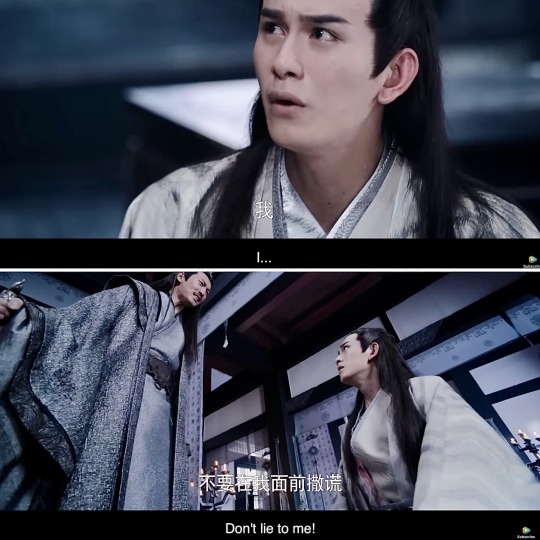
i am once again re-reading the entirety of the empathy flashback chapters because once i start, i just can't stop! there's just too much important information overflowing from this sequence of events! and considering this is the only lens through which we are able to look back at jin guangyao's past as meng yao--and considering how much that lens hates him at this point in canon--so much of what is presented to us as objective fact has to be examined more critically.
so, it bears repeating: all of this is nie mingjue's resentment-addled fierce corpse's recollection of events at least fourteen years in the past, communicated to the reader through two additional filters--empathy, and wei wuxian himself.
Meng Yao had probably carefully worked out how to avoid the vital areas. With both caution and composure, he pulled the sword out of his stomach, producing a string of small, bloody splashes, and pressed the wound—this was all he did to treat it. Nie MingJue, on the other hand, still remained in the posture that he used when trying to help Meng Yao. Half-kneeling with his head raised, their eyes met.
i mean. sure, i guess? this is related to an ask currently hanging out in my inbox that i haven't been able to answer yet (there are so many asks), but i think we really ought to consider just what a life-threatening gamble this was regardless. also painful! it is painful to stab yourself, and then to mash your hand against an open wound to stop the bleeding! why would anyone choose to do something like this unless they felt they had no other choice?
Nie MingJue didn’t say anything. Meng Yao didn’t say anything either. He sheathed his sword, bowed toward Nie MingJue, and sprinted away without looking back.
i've read a few posts criticizing meng yao in this moment either implying or flat out stating that if he can bow and sprint away, he clearly couldn't have been that injured. leaving aside that nie mingjue is perfectly capable of recognizing a serious injury when he sees one, wei wuxian also sees the blood splashing onto meng yao's body and clothes as he withdraws the sword from himself. so, he's hurt. he has seriously injured himself. that he still forces himself to bow before fleeing does seem significant to me. what else could he possibly have said? what would nie mingjue have wanted to hear him say anyway?
He had just acknowledged his mistake and agreed to receiving his punishment before feigning suicide and setting up a trap. Now, he was already long gone. It was probably Nie MingJue’s first time seeing such a shameless person, especially one that had just been the trusted aide whom he promoted himself.
i could live the rest of my life in this sentence (exaggeration. but only slightly), there is so much going on here--first, that wei wuxian feels confident enough in his understanding and interpretation of nie mingjue via empathy to presume that this is nie mingjue's first exposure to such 'shameless' behaviour, because let's be real, how can he possibly know that? like leaving aside the fact that he is the older brother of the jianghu's most dedicated and shameless drama queen, he's been a sect leader for years at this point. beyond that, he is a sect leader during a time of war. mingjue-xiong has seen some shit, ok? i think it is specifically because this supposed shamelessness comes from someone that he himself trusted and promoted, as wei wuxian next points out, that he is so furious.
this part is key, for me, because it emphasizes not the shamelessness (is it tho?) of meng yao's trickery, but that such trickery could be carried out by someone that nie mingjue himself had invested with such trust. he doesn't just feel betrayed by meng yao, though of course that is part of it. his pride has been injured. which makes sense, given the next part of the text:
For this, he flew into a terrible rage, being especially fierce during the Wen Sect’s battles. Even when Lan XiChen had the time to assist Langya, a few days later, his anger hadn’t died down one bit. As soon as he came, Lan XiChen laughed, “MingJue-xiong, what a temper you seem to be in. Where is Meng Yao? Why does he not come and douse your flames?”
i'm not sure i actually want to know what a 'terrible rage' from nie mingjue looks like given what we already know about his brutality on the battlefield. like... this is after he has decapitated wen ruohan's son, wen xu, and made a brutal display of his head and remains to send a message to qishan. meng yao's betrayal has triggered truly unprecedented levels of rage and fury from nie mingjue, something that was already escalating due to his focused cultivation with the sabre, but it results in a man who absolutely cannot handle hearing meng yao's name.
Nie MingJue, “Don’t mention such a person!”
see? (mingjue-xiong don't snap at lan xichen like that 🥺)
Without any exaggeration, he told Lan XiChen of how Meng Yao killed and planned to blame someone else, then feigned death and ran away. After he heard the story, Lan XiChen was also surprised, “How could this be? Maybe there was a misunderstanding?”
Nie MingJue, “I caught him right on the spot. What misunderstandings could there be?”
Lan XiChen thought for a moment, “Judging from his words, the person whom he killed had definitely done wrong. However, he should not have taken his life either. We are in harsh times, so it is quite difficult to determine who was at fault. I wonder where he is now.”
Nie MingJue spoke in a harsh tone, “He should hope that I don’t catch him. If I do, I’ll offer him as sacrifice to my saber!”
(where's a good theresalottounpackhere.gif when you need one)
first: "without any exaggeration" is doing quite a lot of narrative work! even if we accept that what nie mingjue recounts to lan xichen broadly conforms to what wei wuxian witnessed via empathy, what wei wuxian witnessed in the first place was still nie mingjue's recollection of the events as they transpired. wei wuxian did not witness these events himself with his own eyes. sure, i trust that nie mingjue is telling the truth when he shares this information with lan xichen, but he cannot be an objective source of information for wei wuxian--and i think it is significant that wei wuxian doesn't clock this.
second: i think this is why there is an understandable impulse to respond to lan xichen's circumspection with 'hey what the fuck??' when he says 'maybe there was a misunderstanding.' because we are right in the moment alongside wei wuxian, who does not recognize his own bias. and so we end up like, what do you mean, lan xichen! nie mingjue caught meng yao red-handed! wei wuxian-via-empathy told us so! how could we misunderstand any of this when wei wuxian confirmed for us that nie mingjue did not exaggerate any of his explanation?
but lan xichen's thoughtfulness and his instinct to pause, to seek out additional clarification and understanding, are perfectly rational responses given the circumstances, and ideally what he says is something any equally rational person would say in his position. two people he has invested with a great deal of his trust and esteem are at significantly crossed purposes, and he only has one half of the story. lan xichen obviously trusts that nie mingjue is telling him the truth as he recalls it; he just understands, as wei wuxian clearly cannot, that his understanding of this situation is incomplete until he hears the other half of the story from meng yao himself.
However, as though his words turned into a prophecy, during the next few years, it was almost as if Meng Yao had suddenly disappeared, as if he had sunk like a rock into the ocean. No trace of him was left.
Now, Nie MingJue loathed him in the same manner that he had once valued him. Whenever the name was mentioned, he put on an angered face, expressing things hard to explain in speech. When he was certain that no information could be found, he refused to discuss Meng Yao with another person ever again.
i'll wrap this post up shortly because i've already written much more than i initially intended, but i just want to highlight that literal years pass between their confrontation on the langya front and their bloody reunion in nightless city. that is a long time for nie mingjue to spend "loathing [Meng Yao] in the same manner that he had once valued him"--plenty of time for resentment brought on by his sabre cultivation technique to thoroughly sink its claws into his judgment, and his wounded pride.
#mdzs meta#jin guangyao#meng yao#nie mingjue#something i did not touch on in this post but that i really wanted to#is that while i don't disagree that nmj's judgment has been rattled#i don't think he himself wants to acknowledge that it has been rattled#i don't think he has the psychological bandwidth to handle doubting himself and what that doubt could mean for the war and for his sect#and so for me that rage and fury that follows the langya front encounter is a direct response to that doubt#in addition to having his pride injured#injured pride + doubting his judgment = angry murder sabre getting angrier and murder-y...er
54 notes
·
View notes
Text
I realized I forgot to post my second critical evaluation of Touhou-adjacent Matarajin hot takes meant to be a followup to this ask response a few months ago. Sorry. Time to remedy that.
My current lack of enthusiasm for Okina = Hata no Kawakatsu fan material comes from a somewhat similar place as my disdain for the reddit hot takes about Okina being Okuninushi (though it is obviously less severe). However, I’ll stress that this idea actually goes back to ZUN, instead of being a weird fanon invention - Kawakatsu comes up in the interview.
More under the cut.
ZUN calls Kawakatsu “part of her [Okina’s] true nature” (as a side note, 0 idea what the interviewer means by claiming Kawakatsu has some special connection to komainu; I guess everything at least vaguely Korean is interchangeable?). The fact he refers to Okina “a god of silkworm breeding” in her bio and the dupion spell card seem like Kawakatsu nods, too - Matarajin has nothing to do with sericulture. ZUN’s statements, and the references to the tokyo no kami episode in the game itself, led to a common fan idea that Okina is Kawakatsu outright - I’ve even seen weird theories about Okina being deified Kawakatsu.
In reality there is no source presenting Matarajin as a deification of a real or at least legendary person; he might be a yaksha, a dakini, a “regular” Buddhist deity, even a fox (in a single relatively late source, but hey) but evidently not a deified human (the closest you can get is the speculation about Matarajin being perceived as a tengu). There is also no source directly equating Matarajin and Kawakatsu with each other save for one specific oddity. Konparu Zenchiku in Meishuku Shū identifies Kawakatsu as one of the manifestations of an universal deity he refers to as shukujin, a label which is sometimes applied to Matarajin elsewhere. However, he at no point mentions Matarajin. His disciple Zeami then went further, equating Matarajin with Daikōjin, who is in turn identified as Kawakatsu, but, once again, we are dealing with fundamentally supernatural Kawakatsu, not with the deification of a person. The references are essentially implicit, and we’re dealing with “both might be aspects of a single person’s highly personalized idea of an universal deity”, not “it’s widely agreed figure a is figure b”. For what it’s worth, much more recently Sujung Kim did suggest a network encompassing Matarajin, various Silla-related deities (like Shinra Myōjin), the okina mask, the Hata clan and Kawakatsu specifically in her dissertation (Transcending Locality, Creating Identity: Shinra Myōjin, a Korean Deity in Japan; p. 204-205) but I haven’t really seen other authors bring this up, and she didn’t include a similar section in her subsequent Shinra Myōjin monograph if my memory serves me well. In her case it’s also not as straightforward as “Kawakatsu = Matarajin”, and crucially Shinra Myōjin, Matarajin’s actual Korean connection, is acknowledged; ZUN never brings him up and neither do any fan theories.
My other problem is that most of the Kawakatsu stuff is, frankly, boring. This is a bigger issue I have with the Asuka period Touhou aus though, tbh; nobody is adapting the stuff with immortal monks with laser eyes, immortality elixirs and Mononobe no Moriya being Devadatta, even though THAT’S the core of Shotoku legends. The equation with Kawakatsu essentially takes the complexity of Matarajin away since nobody interprets him the way Zenchiku and Zeami did, he’s consistently just a guy in Touhou hcs as far as I can tell. And that’s a bit boring. Especially when it effectively overshadows entire networks with liver-eating demons, underworld clerks, star deities, and Susanoo on top.
There’s also the question whether there is all that much Kawakatsu material to adapt in the first place. Can’t really do anything with the menreiki origin legend because it’s been done already, without Okina (I do think that was a mistake, but I doubt ZUN has even a slight idea that Okina will exist some day when he wrote Kokoro’s arc). The popular Edo period legend casting him as a reincarnation of Qin Shi Huang, while really fun, is not exactly easy to reconcile with any Matarajin background. There’s more promising material like legends considering him a manifestation of Bishamonten or Kōjin (under the name Ōsake Daimyōjin) but these require acknowledging the Matarajin connection is basically nonexistent.
11 notes
·
View notes
Text
OK so as someone who just genuinely loved Dual destinies and is keeping my theis length DD apologia in the drafts at least for now. I genuinely want to know why people don't like it.
I have seen this take from so many AA fans who I completely agree about everything else with. I need to understand why it sounds like we played completely different games.
I will put some I've seen but feel differently about under the cut
Critisms I find unfair:
-it doesn't tie up the loose ends AA4 left hanging. We don't hold any of the other games up to this standard because they all properly finish up the characters arcs. Aa5 cannot be blamed for the problems we want to overlook in AA4. I do also love AA4 but it does leave a lot of dangling plot threads that the others don't and that would be a fucking nightmare to tie up *staring directly at sibling reveal*
- Clay comes out if no where. He's very well established through the game. He just isn't mentioned in AA4 just like Fran isn't mentioned in AA1 and Dahlia isn't mentioned before AA3.
Critism I acknowledge is a reasonable opinion people can have but strongly disagree with
-Spilting the game between the protagonists stops them having proper arcs. Athena is our weird girl for this game. She is our maya. We get to play as her for 1.5 cases. For the majority of the game she's taking up the weird girl screen time and she's honestly still doing that in the ones you play as her. She's just a weird girl who happens to be a lawyer. In the main game Apollo and Phoenix have a roughly equal amount of screen time by chapter. They cut the bloated filler not the arcs (yes I will argue that 5-2 is needed for Apollos arc. Its there to set up his relationship with Athena that us a catalyst later on)
-Phoenix and Apollo are OOC. No. Phoenix is still a cryptic little bitch when you don't play as him and in AA4 he was so very clearly missing being a lawyer. It makes sense. Apollo very clearly in the last case of AA4 regains a lot of his respect for Phoenix. No, he doesn't do this on screen but again that is AA4s fault not dual destinies. That's how he acts the last time we see him so that's how he's acting now.
-The Phantom comes out of nowhere. Plot wise, maybe. But so do a lot of AA villians. Thematically, he's the perfect fit. DD is a game about trust. Very, very explicitly. A spy is someone who can't trust anyone. The phantom is a man who's shut himself off so much from emotions that he no longer recognises why trust is needed. And also has an ability that directly preys on people by making them think hes a trustworthy figure. He's not an incredible villian but he is thematically cohesive.
-almost a part 2 to the last point. The Fulbright reveal comes out of nowhere. First of all 5-2 has some very very choice sprite framing lol. But beyond that it also is a thematically smart choice. We as players are conditioned in AA games to trust the recurring detective. The villain should be someone that we trust. The guy was likeable but also fundamentally always kinda hollow and did in fact pull a shit ton of strings in 5-4 that we all ignored because we trusted him. The clues are there. You're just not ment to pick up on them because of the formula of these games.
-Edgeworth doesn't need to be there. Again game with a theme of trust. He doesn't necessarily need to be there but his dynamic with Phoenix does. They spent 3 fucking games setting up how important it is that those two trust each other and in a game about trust his absence would be felt.
-I don't see this a lot but I did see it a few times. Blackquill is a bad prosecutor. Honestly this is a taste thing and I love him. He is my little bastard man. Also thematically he embodies the two people you aren't supposed to trust in these games, a convict and a prosecutor but is actually a cool guy.
-I've never seen this but I can guess it's happened. Pearl comes out of nowhere. Again theme of trust. Phoenix has just lost the two people he's been relying on to trust the most and needed to be reminded that there were other people he loved and trusted so letter from Maya and visit from Pearl.
-mood matrix. I like the mini game I think it's fun. My brain likes to sit and logically think about what emotions it would make sense for someone to feel in situations.
Criticism I agree with but really don't bother me
-Trucy is side lined. Yeah. I love her to pieces and will never complain about getting more of her but it doesn't make sense for her to not be there plot wise and they clearly just didn't have room for her. I am happy with my Trucy scraps. I would visit her and present every piece of evidence to her to get as much dialogue as I could.
-Klavier is sidelined. Also yeah. But he did genuinely need to be there for 5-3 thematically for that case. (It is literally a showdown between his school of thought and the one he thought phoenix had) but they couldn't make him procecutor because he'd be too much on their side. It had to be someone who at that point seems at least a little morally dubious. I wish there was more but I will also happily take my Klavier scraps.
-the anime cutscenes. I don't love them but I do have a little switch in my brain marked "watching anime" that I can flip and enjoy them for what they are.
-the switch of the voiced sound effects. Yes they are worse but like, I can live with it.
Stuff I don't like and won't defend
-turnabout reclaimed racism and fatphobia (also blatant animal welfare ignorance). I'm not defending it or overlooking it but it's not the only game in this franchise to be problematic.
#ace attorney#dual destinies#aa5#aa5 spoilers#gyakuten saiban#dual destinies apologia#phoenix wright#miles edgeworth#apollo justice#clay terran#athena cykes#simon blackquill#bobby fulbright#pearl fey#trucy wright#whenever i write dd apologia i also make it look like i dislike AA4#i dont. i love that game. it is just flawed and i think people who already dislike DD but like AA4 want to pin those flaws on DD#however you see as i am an intellectual i love AA4 while accepting it's flaws instead of pawning it off onnthe next game/hj
89 notes
·
View notes
Note
what do you admire about each beatle?
I love this question!!! I think it's easy to experience the recognition of pain or maladaptive schemas as something like pity (or even an inherent criticism, if you're in the "nice people have nice feelings" camp), so it's good to reaffirm sometimes that people can struggle and still be admirable and that admirable people often struggle.
For the moment I want to set aside the fact that they were all immensely talented and successful because, as much as I do admire that, I think it probably goes without saying. Rather, I want to focus on what I find admirable on a personal level.
JOHN
With John, I think it's his high level of insight. Not just insightful in the normal sense -- although that's very true, too -- but insightful in the psychological sense.
“[Insight] encompasses at least three fundamental characteristics: the awareness of suffering from an illness, an understanding of the cause and source of this suffering, and an acknowledgment of the need for treatment.” via Harvard Review of Psychiatry
I know on the surface this might sound bland, but it's really, really not. It's hard to describe how significant it is to be able to say "I'm in a state of distress but I'm not going to shoot my mouth off because I know later I won't be" when you're actively reliving a childhood trauma, or "I was afraid of the fag in me" to describe his treatment of homosexual men, or "I beat my wife because I felt a need to control her," but suffice to say the average person won't achieve that level of self-insight, honesty, or emotional differentiation after years of therapy.
In a sense, insight is the ability to exist inside of a deeply distorted, deeply painful reality and realize that reality has been distorted and your perceptions cannot be trusted. It comes from a willingness to face your pain and do the horrible fucking work of untangling it, and John was so immensely dedicated to that work, even when the right methods may not have been accessible or even in existence.
I know the presentism in our perceptions of mental illness gives rise to stupid ideas like "if he really wanted to get better he would have," but the truth is it's so powerful to be faced with a severe illness that is hurting you and everyone around you and keep fighting it even when it's apparently hopeless. Most people don't do that.
PAUL
I'm having trouble finding the right word for the quality I most admire, but I think it might be "force of will."
An example would be pushing the beatles to keep going even after everyone else was starting to lose interest (we know via Ringo that we wouldn't have the last few albums without Paul), which is obviously an expression of work ethic and determination and commitment, but there's another quality there, too, that manifests in so many ways throughout his entire life. It's almost a kind of confidence, but not really, because I think we can fairly say that Paul had a lot insecurity, too.
Rather, I think it's the seed of belief necessary to pursue any creative field or ambitious project -- not so much that you always think you're going to succeed, but that part of you believes that it's possible and that you deserve it. People joke about Paul not being self-aware, but self-awareness is not a universally good thing, and part of the counterpoint to self-awareness is the ability to pursue your dreams. The courage to want things that you might never get, and to believe that you deserve them. Without that, you're not getting anywhere.
There's an expression that there's a day you're born and a day you find out why you were born, but I'd add the caveat that figuring out why you were born is meaningless unless you have the guts to do something about it. And Paul definitely had guts.
GEORGE
This is another quality that's a bit hard to describe, but I think what I'm trying to articulate is the act of reaching out to other people and creating points of connection. Or, the desire and courage to do so.
Obviously there are stories about how empathetic he was, such a good listener, compassionate, interested in other people, etc. But I think this quality also manifests in how widely and deeply loved he was by his contemporaries, how forming long-lasting friendships and then doing the work to maintain those friendships was such a defining aspect of his life. How he seemed happy to have intense relationships with others as an equal or as a student, not just as their boss or idol. He genuinely wanted to connect to people on an individual level, as peers, and to support them and be supported.
There's also a conversation to be had about how earnest he was about his beliefs, which I know some people find cringey or even didactic, but you could also argue that earnestly expressing what you believe without indirection or plausible deniability is a very sincere bid for connection. Earnestness opens you up to mockery and fault-finding, and a lot of people absolutely find it off-putting, but it's also the only real cure for isolation. And it seems clear that George did not want to be isolated, he wanted to experience sincere connections with the people and the world around him.
There's also probably a conversation to be had about humor as a bid for connection, and how his tendency to take himself lightly is more an extension of that earnestness than a counterpoint to it, but that's a discussion for another day.
RINGO
I know people often admire his level-headedness and his patience -- and it's true that he's almost superhuman in that respect -- but, to be honest, I think that may partly be an expression of Ringo's addictive personality and emotionally neglectful childhood which arguably put him in a position of being extremely distanced from his own emotions/needs. Not that I don't think it's impressive to be able to absorb nearly infinite distress, but I don't necessarily admire it.
Rather, what's more admirable to me is his capacity for change.
I always find him the most relatable, not so much because I find him similar to myself (though that's also true), but because he's such a typical Male Figure in my social context. He's a total stand-up guy who would give you the shirt off his back and then turn around and be, by his own account, absolutely horrible to his wife and children. Which is a bizarre contrast, but also a very common one, and in a way I think that perceived normalcy makes him feel almost touchable to a lot of us. Like he of all the beatles actually existed in the real world, or at least in a world that exists for us as well.
I also think the sheer normalcy of "nice guy who's not so nice to his family when he's been drinking" creates the illusion that he's not worth exploring and that's why so many people ignore him in their quest to understand the group, but that's also a conversation for another day.
What's sort of profound and incredible about him, though, isn't existing in the real world but changing his world. Moving from someone deeply familiar, close enough to touch, to someone untouchable but inspiring. What I'm saying is that he got sober after decades of heavy drinking and, apparently, has stayed sober for thirty years. Which seems to heavily imply that he likes being alive more than he likes being numb, which is a major accomplishment for anyone with an addictive personality.
It's like he started here on earth with the rest of us, and then stepped through a portal into a different reality, and ceased to be at all touchable or real but instead became aspirational, or happy. It makes it seem like that aspirational, untouchable world could become touchable to all of us, too. Like it's not our inherent nature that makes us happy, not the world we're in right now, but the capacity to change our world by changing ourselves.
#ask#anon#this is such a wholesome question#this post is very earnest but I can't go and say that I admire earnestness and then play it cool now can I#longer rambles
16 notes
·
View notes
Text
I'm sure I'll write a full fledge headcanon about Silver later, but if you've spoken to me ooc like, ever, you've probably already heard this rant from me before but this is me formally putting it on my blog ( at least in an informal way )
I do not like the fact that Silver is Gray's father. I absolutely hate what it does to Gray's character from tartarous going forward and it's so... so goddamn messy and poorly thought out.
Silver as a character is fine. fundamentally I have no problems with Silver. My problems lie with Silver appearing out of fucking nowhere as Gray's father and Gray's entire character goal swinging violently to match Silver's goal and just ??? NO?!?! Up until this point in the story Gray has had little no mention of his parents or any lingering feelings towards them. Like, we know they died during the Deliora attack and that's it. Besides their death, Gray's parents were of little to no concern about Gray's story or development. But you know what adult has had an important impact on Gray's life and his character as a whole?
FUCKING UR !!!
Silver is brought in and Gray is forced to take on his mission of killing END because there needs to be Drama between Gray and Natsu during the final arc and let's ignore the fact that it's character assassination, Gray's doing it for his Father who he has NEVER ONCE BROUGHT UP BEFORE THIS.
Silver is FINE as a character but he murder's Gray's entire character motivations because Gray suddenly becomes obsessed with carrying out his Father's wish when literally the 7+ arcs before this Gray could have genuinely given less of a shit.
Anyways, this is a long, ranting way of me saying I DON'T ACKNOWLEDGE SILVER BEGIN GRAY'S FATHER ON THIS BLOG. I have a few idea's as to how I can still have Gray be after END without it revolving around him becoming obsessed with his father ( might actually tweak an idea from one of the video games but that's for anther time ) but yeah. Silver isn't Gray's father. I'm fine writing with Silver's that acknowledge Gray as their son and can work with that, but like, in all other situations... Silver isn't his dad.
#❄*:·. « psa. »#❄*:·. « ooc. »#THIS IS SUCH A RANT#like don't get me wrong i think silver unconnected to gray is fine#and while i do love the tragic beauty of silver realizing his son is alive and realizing his entire mission was basically for nothing#cannot for the life of me stand what it does to gray's character
9 notes
·
View notes